#russian army lost young men
Text
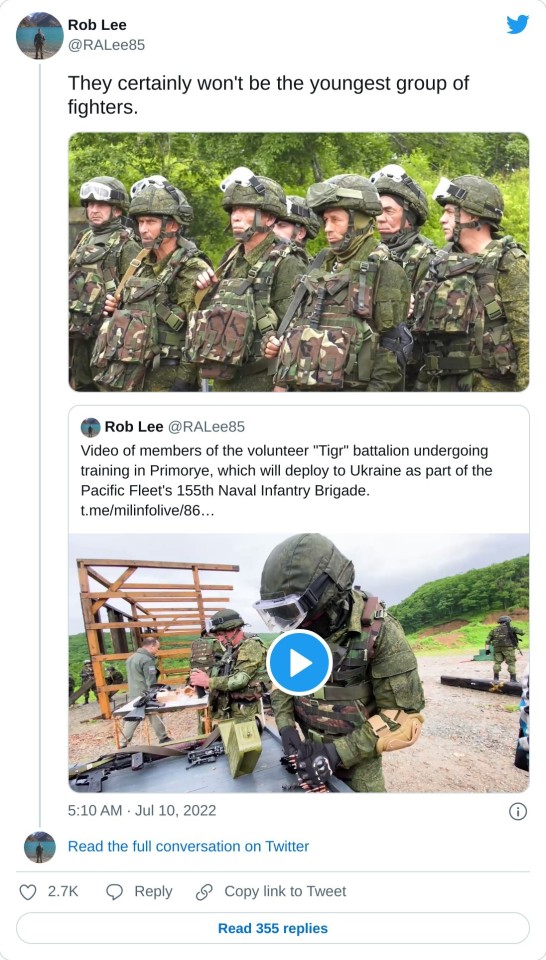
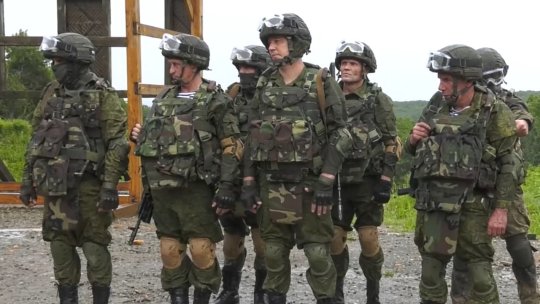
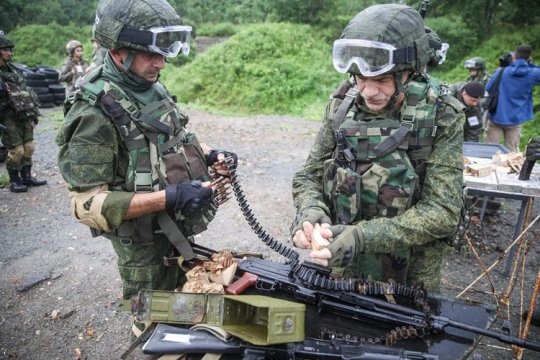
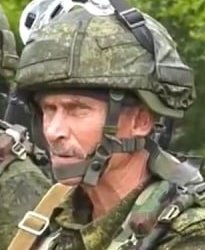

#russian volunteers#tigr batallion#60 years old plus volunteers#russian army lost young men#russia moving reserve forces#russia will crack first#ukraine resistance#ukraine war#putin war criminal#defend ukraine#i stand with ukraine
1 note
·
View note
Text
Battle near Kruty
HOW THE YOUNG PEOPLE DEFENDED KYIV
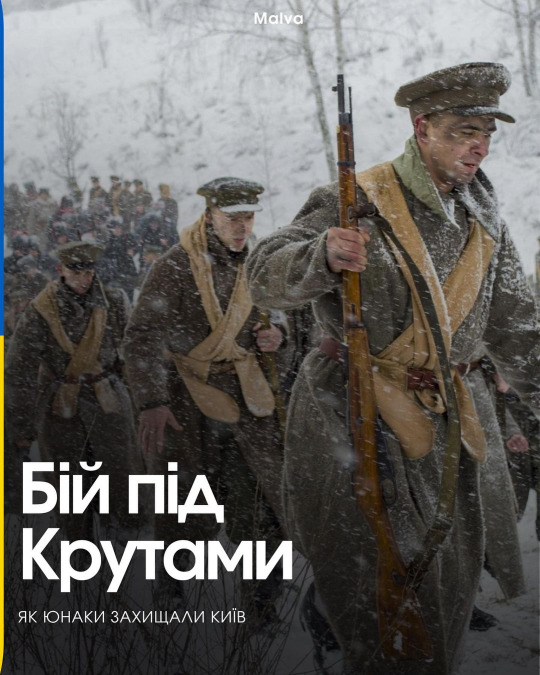

On January 29, 1918, the battle near Kruty took place. At that time, about 400 cadets and students held back the attack on Kyiv by the almost 4000 strong Bolshevik army. The Battle of Kruty took place at the Kruty railway station in modern Chernihiv Oblast, 130 kilometers from Kyiv. It lasted more than five hours.
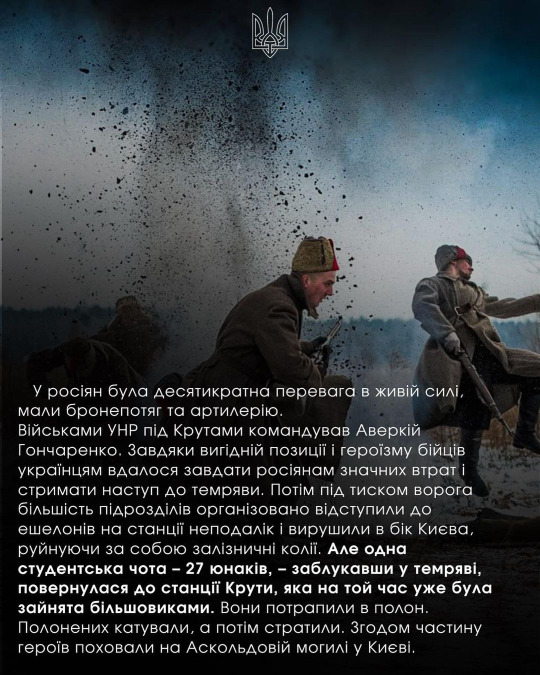
The Russians had a tenfold advantage in manpower, they had an armored train and artillery. Averkiy Goncharenko commanded the UNR troops near Kruty. Thanks to the advantageous position and the heroism of the fighters, the Ukrainians managed to inflict significant losses on the Russians and restrain the offensive until dark. Then, under the pressure of the enemy, most of the units retreated in an organized manner to the echelons at the station nearby and went towards Kyiv, destroying the railway tracks behind them. But one group of students - 27 young men - got lost in the dark and returned to the Kruty station, which at that time was already occupied by the Bolsheviks. They were captured. The prisoners were tortured and then executed. Later, some of the heroes were buried at the Askold grave in Kyiv.

Today, the names of 20 of them are known. These are students of the People's University Oleksandr Sherstyuk, Isidor Puryk, Borozenko-Kononchuk, Golovaschuk, Chyzhov, Sirik, Omelchenko (centurion); students of St. Volodymyr Kyiv University Oleksandr Popovych, Volodymyr Shulgin, Mykola Lyzogub, Bozhko-Bozhynskyi, Dmytrenko, Andriiv; high school students of the 2nd Cyril and Methodius high school Andriy Sokolovskyi, Yevhen Ternavskyi, Volodymyr Hnatkevych, Grihyr Pipskyi, Ivan Sorokevich, Pavlo Kolchenko (ensign), Mykola Hankevich.
#ukraine#russian agression#ukraine war#war#stop russia#stop putin#stop war#war crimes#russian terrorism#genocide
63 notes
·
View notes
Text
Drama Red
a/n: okay it's my first songfic, honestly it was cool and I plan to do a second but it's really hard to translate lyrics and try to keep some sense so sorry...
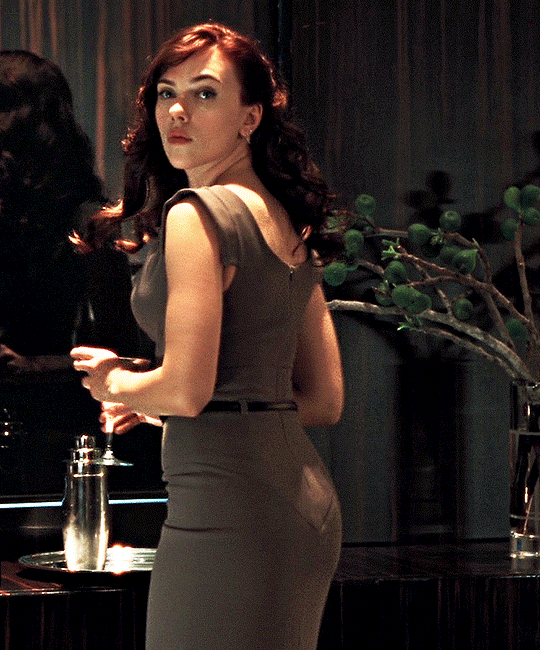
*not my GIF*
Natasha Romanoff x Female!Reader
Summary: Natasha has only one question to ask you but before she thought about your life with her.
Type: Fluff
Warning: me being really bad for a first time like always
word count: 3298
Here is a link to the orignal song if you want (warning it's a french song)
--------
Natasha was sitting on your bed; she was looking at you while you finished your make-up. Today was Yelena's birthday, and Melina decided to do something special (just a party with the people she knows). A song was playing in the background, and she let herself get lost in her mind when she listened to the lyrics.
~~
To find the love now, it's the grail.
To find the love now, it's the grail.
A little bit of drama red on your lips
~~
"Hey Nat, did you hear me?" You asked, and she came out of her trance just to look at you.
"Excuse me. What did you say?" She asked shyly, and you smiled at her.
"Do you think this lipstick is good?" you asked again, and she nodded. Nat brought you this just two days prior because it reminded her of you. "Are you sure because I don't want to look bad in front of your mom?"
"Oh come on, you know she loves you, maybe even more than me." She joked, and you kissed her before grabbing your purse and your present for her sister and leaving the house.
In the car, Natasha was playing the same song, and while you drove, she was focused on two things: you and how this song reminded her of you two.
~~
We're not obligated to be enamoured to love each other.
The wedding is to please the motha.
The wedding is to please the motha.
The wedding is to please the motha.
But I'll even ask you if you want to marry me
~~
Your relationship was not always so beautiful. When you met her, it was when Fury asked you to team up with her and Clint a few months after she joined the SHIELD. Even if the idea of pairing you with another young, talented agent was rather good to him, you and Natasha didn't match at first. She didn't want to make new friends, and you weren't strong enough to deal with her stubbornness.
It was like that until one mission. This mission was simple: infiltrate a base, steal some information, and come back to the headquarters. See? Pretty simple. But something happened, and you had to fight—just you two against an army of dangerous men, all armed and ready to kill you.
"Oh, super plan Y/n; now I hope you're ready to die." the Russian said, and you rolled your eyes.
"How should I've known there were so many guys?" you asked, and she felt more angrier.
"Maybe because we're in enmity territorial, тупица (dumbass)." the redhead replied, visibly angry.
"Oh, don't use the Russian card with me, Romanova."
"Don't call me like that."
"And don't call me dumbass."
"You understood?"
"Oh, come on, I'm an agent; I need to speak a lot of languages." you replied, and suddenly you noticed something. "Do you hear this?" you asked, and she looked confused.
"I don't hear anything," she replied.
"That's the point." you said and stood up from your hiding spot to look around "Where are they?" you asked to no one in particular.
"Y/n!" Natasha called you, and you immediately looked at her. "Look." she instructed, and you followed her finger to find a timer.
"What's sons of the b*tches. They had a bomb." you said quitely, and Natasha giggled. It was definitely not the reaction she expected. "Okay, I'll call Fury. And you, try to find a way to escape." you said.
"You're not the boss of me." she replied, and you groaned.
"It's really not the time for this Romanoff!" you yelled, and she flinched a little. "Sorry, but you need to hurry." you said, and she left. You took a moment to regroup and reorganize your mind. "Fury, we have a problem." you said through the communications.
"What is this agent Y/l/n?" he asked.
"There is a bomb, in front of me, ready to explode. I think I can stop it, but if I don't, I need you to come and bring back agent Romanoff." you announced and thought for a moment.
"I can send a group of men there, but agent Y/l/n, do me a favor." he said
"What?"
"Don't force me to inform your family that you didn't make it."
"Oh, come on, Fury, we both know you'll not have to do it." you replied, and he chuckled.
"Oh, so how much time?" he asked.
"Three minutes." you replied.
"It will be close, but they should be there in time. Good luck, Y/n." he said and ended the call.
Outside of the base, Natasha was anxious; she heard your conversation with Fury, and she couldn't stop thinking that maybe she should have stayed.
She wanted to come back for you when she heard the quinjet and an agent come out, and before he could say anything, the floor where she let you; explode. The two agents were both shocked, but fortunately for Fury, you found a way out of the chaos.
"What was that?" the agent said, and you didn't reply first to catch your breath.
"I didn't find a way to stop the bomb, so I did the most obvious thing." you said, and they both looked at you, expecting something more. "I made it explode a little earlier." you explained, and Natasha slammed your shoulder.
"You could have died." she said, and you could hear worry in her voice for the first time since you met her.
"You're welcome, agent Romanoff." You joked, and the agent rolled his eyes.
"Fury will not be happy." he said, and you made a weird face but didn't say anything. When you were back in the HQ, you couldn't stop yourself from tease Natasha, and to your own surprise, you earned the right to call her Natasha.
~~
The time repair but look around us how the people are drifting apart
I have to change of my watch, to change of world
Look around us how the people are wrong
~~
At her parent's house, you quickly made your way to the kitchen, where the star of the day was with her mom. "Happy Birthday, sister-in-law!" You greeted her, and she rolled her eyes. She really liked it when you called her that; she liked you, and honestly, you should already be her sister-in-law since a while if her sister was not so….Nat.
After you hugged the blonde, you walked immediately to Melina, who opened her arms wide for you. "How was the drive?" she asked.
"Pretty tiring, but we're finally here. You really should start to think about moving near us." you said, and she laughed
"Okay, I'll think about it for the next time, but right now, I think someone wants to see you." She pointed to the living room where Wanda was.You let out a little sigh and made your way into the room while Natasha stayed behind with the two women.
"Hey Wands, why this long face again?" You asked, sitting beside her, and she sighed.
"It's Vision," she confessed, and you rolled your eyes.
"Again?" you asked dramatically, and she let out a little chuckle. "What did he do this time?"
"Nothing." she replied, and you frowned your eyebrows.
"And where is the problem?" you asked, completely confused.
"I mean, maybe I was too harsh with him. Perhaps I should let him explain before I decide to end this." she said, and you nodded.
Vision and her recently broke up, and being the good friend you are, you tried your best to help her not regret what she did, but apparently it didn't work.
"You want to give him a second chance?" you asked, and even if you were furious with the fact that he made her cry, if she wanted to forgive him, who were you to say no?
~~
I need rational love; I need to learn how to trust the human race.
I need to be sure that I am the problem.
I need to be sure that you are the cure.
~~
"So?" Yelena asked, and her sister looked at her confused. "How's going with you and Y/n?"
"What do you mean?" The Natasha replied.
"Did you propose to her or not?" Melina said, and her eldest daughter sighed.
"Oh, come on, we already talked about it. I don't know if we're ready?"
"What do you mean? You're dating since five years now. I think you're ready." Yelena said, and her mom nodded to agree.
"Okay. But maybe I'm not ready." The redhead announced.
"You fought aliens together, and you think you're not ready?" The blonde asked, but her sister didn't have time to reply before Thor came to greet the young widow. The redhead used this distraction to leave this conversation.
~~
I talk to her about me; she talks about us, 'bout us, 'bout us.
She's in love with the love, the love, the love, but...
~~
Natasha made her way to the living room where you were, and she heard you talk with Wanda and Kate, who joined you a few seconds prior.
"Wait, a cat?" The archer said, and you nodded.
"Yeah, Natasha said she wants a cat. So I thought we could adopt one together, but for now she doesn't know, so don't ruin my surprise." You warned Kate, and she nodded quietly.
~~
To find the love now, it's the grail.
To find the love now, it's the grail.
A little drama red on your lips
~~
Natasha didn't make her presence known for a moment. She just stayed here and looked at you while you talked and laughed with Kate and Wanda. Unfortunately for her, Melina came and stayed beside her.
~~
We're not obligated to be enamoured to love each other.
The wedding is to please the motha.
The wedding is to please the motha.
~~
"I know it looks like I want to control your life, but I think you really need to ask her." Melina said, and Natasha looked at her.
"What do you—" "Hey Nat, come here." The young archer exclaimed, and your girlfriend took a last look at her mom before she came and sat beside you.
The wedding is to please the motha.
But I'll even ask you if you want to marry me
~~
When she sat, you placed your hand on her tight and she placed her hand in yours. She really wanted it, but she had to wait for the right moment. At least that's what she said to herself.
~~
On all the streets of the city, we wandered.
Even if we don't marry, we will be happy.
You know I'm not the type to be engaged.
You know I'm more the type to be bored.
~~
Natasha was playing with your hand while you were talking, and she unconsciously focused her gaze on your fingers. She couldn't help but think about this day one week ago, when you were doing shopping. You spotted a jewelry shop, and you stopped in front of the window to look at the necklace and the earrings. Your girlfriend stopped next to you, and her gaze fell on a beautiful ring. 'It'll look good on you' she thought, and before she could make this comment aloud, you dragged her to another bookstore for the third time this afternoon.
The Russian looked at you in the store; you were trying to find a new book for her, and she started to think about her life before you started dating. She didn't imagine herself in a relationship for five years, but maybe it was because they weren't you.
~~
People who stay together for the life
Before they become lovers, they are friends.
We'll try to make one all night, but
We stay kids as long as our parents are alive
~~
"Where is Lucky?" Yelena asked, and this brought back her sister from her memories.
"He's with my mom. He had an appointment with the vet, and he was too tired to come." The brunette said the blonde nodded. "If Melina had called me earlier, I would have brought him."
"It's not my fault if you are not aware of everything." Melina said, and you chuckled.
"Oh come on Melina, you called me when I was sleeping; I almost won't be able to come." Wanda spoke dramatically, and you laughed.
"Sorry, but you have bad timing, Melina." You said, and the older woman glared at you.
"Oh, and what were you doing, you two?" She said pointing at you and Natasha, but neither of you replied. You blushed, and Wanda gasped.
"It's totally gross." The sokovian said, and you chuckled. "And Nat, you really replied?" She asked, and your girlfriend blushed.
"Of course, I replied. She's my mom, and she could be scary when you don't reply to her calls." The Russian defends herself.
"But you were..." The witch spoke, and Yelena seemed to finally notice what you were talking about.
"Okay, can we not talk about my sister's sex life for my birthday, please?" The blonde asked, but it was more of an order. Kate fake gagged, and you rolled your eyes.
"Oh come on, stop acting like you just discovered that." You said.
"Y/n stop!" The two sisters said, and you laughed.
~~
I talk to her about me; she talks about us, about us, about us.
She's in love with the love, the love, the love, but...
~~
"Is it true that you want to move on?" Kate asked, and you frowned at your eyebrows.
"How do you know that?" You asked her.
"Clint told me." She replied and shrugged her shoulders.
"And it's true." Natasha said. "I want a big house. I mean, I love our house now, but I need a new training room." She explained.
"And we also need a porch, for our home date." You added, and your girlfriend chuckled. You were definitely the more romantic, but it's okay because you loved it.
~~
To find the love now, it's the grail.
To find the love now, it's the grail.
A little drama red on your lips
We're not obligated to be enamoured to love each other.
~~
After a little more talk, you excuse yourself to go to the bathroom. When you left, all eyes were now on the redheaded Russian. She was totally oblivious because her own attention was focused on the wine glass on the table; there was a lipstick mark on it, your lipstick mark.
~~
The wedding is to please the motha.
The wedding is to please the motha.
~~
You came back but immediately excused yourself again, but to the kitchen now. And this time Melina cleared her throat, and her daughter looked at her.
"I think it's the best time now." Melina said, and Wanda and Kate looked at Natasha, confused.
"Wait, you didn't propose to her yet?" The young brunette said, and Natasha sighed.
"But why?" The sokovian asked this time.
"Apparently she's not ready." The blonde Russian said.
"What do you mean you're not ready?" Wanda asked, visibly shocked. "I've known you for a while now, and I think everybody here can confirm that nobody made you happier than her. So what is the problem?"
"But if she doesn't want?" Natasha asked, and Kate groaned.
"Oh come on, Nat, she called Yelena her sister-in-law, she only has an eye for you, and every time we talk about weddings, she's the most implied." The archer said.
"She has like, twenty wedding dresses in her gallery picture." Wanda said.
"And she even did the guess list." Yelena added, and her sister was shocked.
"Hear. She's totally ready and she wait you." Melina said. "You fought aliens and Nazis and took down one of the worst HQs in the world together. So why you should not be ready? You know everything about each other, and you love each other, despite the fact that you always act like an old married couple. So what's your point?"
Natasha processed all she heard and took a deep breath before standing up. "If she says no, I'll be desperate." She said before storming to the kitchen.
~~
The wedding is to please the motha.
But I'll even ask you if you want to marry me.
~~
"Hey babe, sorry I was about to come, but Lila sent me a video of this cat." You said when you saw Nat enter the kitchen. She stopped beside you, and you showed her the video.
"He's so cute." She cooed, and you smiled.
"Did you see that?" You looked at her, and she was nervous. Girlfriend instinct, you made her sit on the nearest chair and took her hands for a little reassurance. "What's going on?" You asked.
"I have something to ask you." She spoke, and you nodded. Okay, don't laugh. I didn't prepare anything." She warned you, and you nodded again. "Okay Y/n. I wanted to wait for the right time, but I found that there was really no wrong time; I was just afraid. We've been together for a long time now; you were with me during the attack on New York; you were here when we fought Hydra; we ran away together after the accords; and you helped me destroy the red room." She paused to take a breath. "I know I was not ready until now, and the girls said that I didn't really have to be scared or anything. I'm sure you already chose the dress, and apparently you even did the guess list. You're very precious to me, and what I could do without you..." She was rambling, but you stopped her.
"Wait, who told you about the guess list?" You asked.
"Yelena. But this is not the time now." She spoke, and you nodded. "So today I was like, 'no, Nat, she would never want to spend all her life with you, like, why?' but after I talked with the girls, they were like, Wait, you're totally dumb to think that she doesn't want it' and I was like, 'Really?', and they were like 'its obvious she want' and here we are now." She took a deep breath. "Man, I'm really nervous." She said, and you chuckled.
"Sooo?" you asked.
"Yeah, I want to ask you, do you want to marry me?" She asked, and she didn't let you have the chance to reply before she was rambling again. "Wait, you're not obligated or anything. It's not because we spent five years together that's mean you want to spend more. It's just you always so–"
You kissed her to stop her, and when you pulled away, she was confused. "Yes, Natasha, I want to marry you." You said, and she started to cry.
"You want to? Even though I'm definitely not the best–"
You kissed her again. "Yes, I want to marry you. And don't worry, I really think you're the best choice for me." You said, and she smiled. "Usually it should be the one who's been proposed who should cry." You joked, and she chuckled.
"I was nervous" she admitted, and you kissed her forehead.
"And how are you now?" You asked.
"Relive and happy." She said, and you smiled.
"I can't wait to call you my wife." You said, and she grinned. You wanted to say something else, but some footsteps stopped you. When you both looked in the direction of the sounds, you found the women there, visibly waiting for something.
"She said yes!!" Natasha yelled, and you laughed. The women face were now bright with a wide smile.
"It's the best present you could get me." Yelena said, and you hugged her.
"You're such a drama queen, sister-in-law." You replied, and you rolled your eyes.
Yes, that's it. Natasha watched you talk with her sister, and honestly, she was more than happy to finally asked you the question. You're totally hers now, and she's totally yours.
#natasha romanoff#natasha romonova#natasha romanoff x fem!reader#natasha romanoff x female reader#natasha romanoff fluff#yelena belova#yelena belova x fem!reader#wanda maximoff#wanda maximoff x female reader#kate bishop#kate bishop x fem!reader#melina vostokoff#melina vostokova#melina vostokoff x reader#marvel fanfic#marvel fic
143 notes
·
View notes
Text
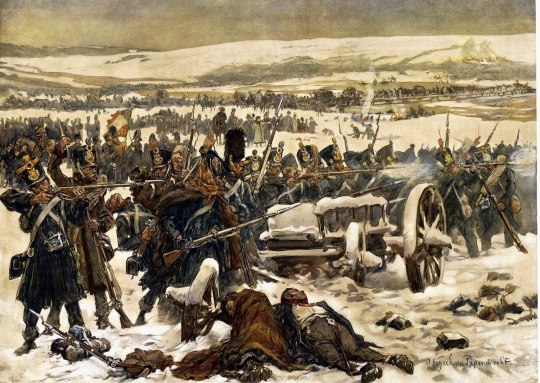
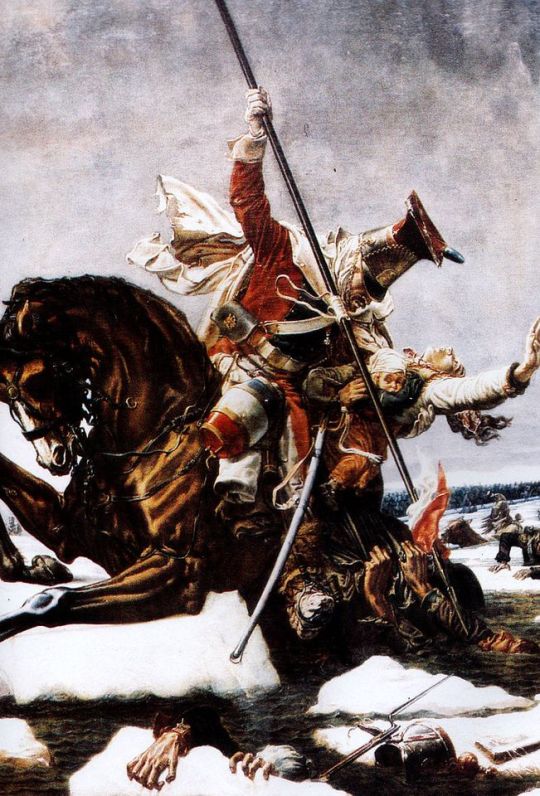



Berezina Retreat
Between 26-29 November, Napoleon's Grande Armee crossed the Berezina river at Borisov. The losses for Napoleon were great, more than 22,000 French forces would not make it to the other side of the river. Of these casualties, five of them were family members of mine (tragically enough four out of five were brothers as well). Despite the heavy losses, the crossing is seen as a logistic victory as Napoleon with the remnants of his army managed to escape and return to France.
As Napoleon's army reached Bobr, 50km away from Borisov, Napoleon was informed that the bridge at Borisov had been destroyed and the French garrison captured. At the same time a French cavalry brigade discovered a spot where they might be able to cross the river 13km north of Borisov. So on 25th November, the construction of bridges were started by mainly Dutch engineers. The water was close to freezing, only 40 of the 400 Dutch engineers survived the construction of the bridges.
To draw the Russian's attention away from the bridges being built, a diversion was undertaken by Oudinot's corps which led the Russians to believe that the French would either attempt to attack at Borisov and repair the bridge or cross the river south of the place. This resulted in the bulk of the Russian army moving southwards which enabled Napoleon to cross the army.
During the night of 26-27 November, the crossing began but the Russian forces also became aware of the French attempt and tried to return northwards, they were however stopped by Oudinot's battalions. By midday of the 27th, Napoleon and his imperial guard had crossed the river, Marshal Davout's and Prince Eugene's corps also managed to cross the river before the day's end. Meanwhile Marshal Victor's IX corps was given the order to defend against the approaching Russians in order to buy more time for the others to cross. Unfortunately the Dutch regiments were part of Oudinot's forces and most of them sadly died defending the Berezina crossing.
On 28th November, the Russian forces attacked Napoleon's army on both sides of the river. The crossing turned into a completely chaotic stampede as thousands of people, soldiers and stragglers rushed for the bridges. Some of the men tried to swim across the river which was a futile attempt since the water was so cold. There was a mad rush to cross the river since the stragglers knew that the temporary bridges would be destroyed, which happened at 08:00 in the morning on the 29th. tens of thousands of stragglers, both civilian and soldiers, did not manage to cross the river and were now at the mercy of the Russians.
As the bridges were set on fire, the Russians were no longer able to pursue the French army. The French retreat was therefore almost complete, with the Russians no longer on their tail and friendly territory nearby, the remnants of the army had escaped. The casualties were heavy, between 20-30,000 French soldiers died, the IXth corpse was hit particulary heavy as they lost half of their strength trying to protect the bridgehead. Besides the 20-30,000 military casualties, an additional 30,000 noncombatants died as well as result of the crossing and capture by the Russians. 40,000 French soldiers managed to cross the river, with Napoleon's imperial guard still being relatively intact.
Harking back on these relatives of mine, four out of five who died during the Berezina crossing were brothers, but there were other relatives of mine who participated in the Russia campaign, nine to be precies, of the 14 family members who served under Napoleon. Only two out of these nine relatives survived the Russia campaign, which is why those two are my 3rd great grandfathers and the other six are my 3rd great grand uncles as they all died young without partners or children. Here are the names of my relatives who died during the Berezina crossing:
Christiaan Daniels Nijhuis (third great grand uncle), served with the 125é regiment.
Hendrik Reeder (third great grand uncle), served with the 125é regiment.
Christiaan Daniels Nijhuis (third great grand uncle), served with the 125é regiment.
Johannes Reeder (third great grand uncle), Served with the 125é regiment.
Jean Mélard (fourth great grand uncle), served with the 48é regiment.
Here are the names of my other four relatives who participated in the 1812 Russia campaign:
Christiaan Reeder (third great grandfather), served with the 125é regiment and survived.
Jan Bakhuizen (fourth great grandfather), served with the Imperial guard as a red lancer, he survived though never returned to the army so was marked as missing in action.
Willem van Rijn (fourth great grand uncle), served with the 14é regiment cuirassiers, died during the Russia campaign possibly during the Berezina crossing on 28th November during Doumerc's charge.
Martinus van der Spek (first cousin 6 times removed), served with the 33é lights regiment but did not survive the campaign.

Images include: pictures of the crossing, a red lancer defending his family while crossing, Dutch engineers building the bridge in ice cold water, remains found at the Berezina during ww1 by German soldiers and a document of one of my five relatives who died at Berezina.
45 notes
·
View notes
Text
THIS DAY IN GAY HISTORY
based on: The White Crane Institute's 'Gay Wisdom', Gay Birthdays, Gay For Today, Famous GLBT, glbt-Gay Encylopedia, Today in Gay History, Wikipedia, and more … November 30

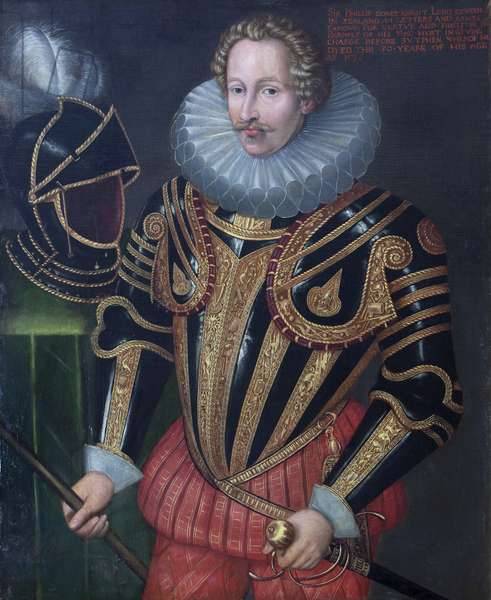
1554 – Sir Philip Sidney, English courtier, soldier, and writer (d.1586); the English courtier and poet was one of the leading lights of Queen Elizabeth's court and a model of Renaissance chivalry. His Apostrophel and Stella is one of the great sonnet sequences in English and was inspired by his love for Penelope Devereaux, even though he later married Frances Walsingham. Lest one confuse Renaissance "love" and "marriage" with the modern versions, it should be pointed out that Penelope Devereaux was 12-years old when Sidney fell in love with her, and that Frances Walsingham was 14 when she was married to the 29-year-old courtier. Marriages were arranged then and not made in heaven, more a real estate transaction than a spiritual love match.
Sidney, himself, was in his teens when the Huguenot writer and diplomat Hubert Languet fell in love with him. Languet was 36 years his senior, lived with him for a time, and, when they parted, wrote passionate letters to him weekly. In his youth, Sidney was strongly attached to two young men, Fulke Greville and Edward Dyer, and wrote love verses to them both, a point not lost on gay John Addington Symonds when he wrote Sidney's biography.
Sidney died in battle at the age of 32. According to the story, while lying wounded he gave his water-bottle to another wounded soldier, saying, "Thy necessity is yet greater than mine". This became possibly the most famous story about Sir Phillip, intended to illustrate his noble character.


1864 – Died: Major General Patrick (Ronayne) Cleburne (b.1828), who was an Irish American soldier, best known for his service in the Confederate States Army during the American Civil War. Born in County Cork, Ireland, Cleburne served in the 41st Regiment of Foot of the British Army after failing to gain entrance into Trinity College of Medicine in 1846. He emigrated to the U.S. three years later. At the beginning of the Civil War, Cleburne sided with the Confederacy. He progressed from being a private soldier in the local militia to a division commander. Cleburne participated in many successful military campaigns, especially the Battle of Stones River and the Battle of Ringgold Gap. His strategic ability gained him the nickname "Stonewall of the West".
According to Randy Shilts ("Conduct Unbecoming"), the Major General might have earned the "Stonewall" appellation for less martial reasons. According to Shilts in his bestselling Conduct Unbecoming the Major General was a 'life-long bachelor' and wrote of the great love of his life:
Cleburne's relationship with his twenty-two year old adjutant, Captain Irving Ashby Buck, drew the notice of the general's colleagues. Cleburne's biographer John Francis Maguire wrote that the general's 'attachment' to Buck 'was a very strong one' and that Buck 'for nearly two years of the war, shared Cleburne's labors during the day and his blankets at night.' Buck himself wrote that the pair were 'close and confidential. I habitually messed with him and shared his tent and often his blankets."
Prior to the campaigning season of 1864, Cleburne became engaged to Susan Tarleton of Mobile, Alabama. Their marriage was never to be, as Cleburne was killed during an ill-conceived assault (which he opposed) on Union fortifications at the Battle of Franklin, just south of Nashville, Tennessee, on November 30, 1864.

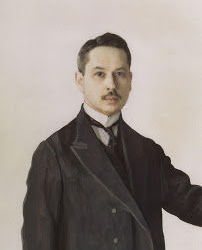
Self-portrait
1869 – Konstantin Somov (d.1939) Russian Artist associated with the Mir iskusstva. He was the son of a curator at the Hermitage, and he attended the St Petersburg Academy of Art from 1888 to 1897, studying under the Realist painter Il'ya Repin from 1894. Somov was homosexual, like many of the World of Art members.

Sleeping Nude
In 1897 and again in 18989 he went to Paris and attended the studios of Filippo Colarossi and of Whistler. Neither the Realism of his Russian teachers nor the evanescent quality of Whistler's art was reflected for long in Somov's work. He turned instead for inspiration to the Old Masters in the Hermitage and to works of contemporary English and German artists, which he knew from visits abroad and from the art journals.
Following the Russian Revolution, he emigrated to the United States, but found the country "absolutely alien to his art" and moved to Paris. He was buried at the Sainte-Genevieve-des-Bois Cemetery.


1874 – Winston Churchill, British prime minister and statesman (d.1965). He was Britain's wartime prime minister whose courageous leadership and defiant rhetoric fortified the English during their long struggle against Hitler's Germany. "I have nothing to offer but blood, toil, tears, and sweat," he stated upon becoming prime minister at the beginning of the war. He called Hitler's Reich a "monstrous tyranny, never surpassed in the dark, lamentable catalogue of human crime." Following the war, he coined the term "Iron Curtain" to describe the barrier between areas in Eastern Europe under Soviet control and the free West.
In his wonderfully entertaining and informative biography of W. Somerset Maugham, Ted Morgan tells how Maugham once asked Churchill whether it was true, as the statesman's mother had claimed, that he had had affairs with other young men in his youth.
"Not true!" Churchill replied. "But I once went to bed with a man to see what it was like."
The man turned out to be musical-comedy star, Ivor Novello.
"And what was it like?" asked Maugham.
"Musical" Churchill replied.
Another famous story goes that when Winston Churchill was Prime Minister, he was woken one freezing February morning by a Downing Street aide bearing the shocking news that a male Tory MP had been caught having sex with a naked guardsman in St James’s Park.
Noting that it had been the coldest night of the winter, Churchill is said to have remarked: "Makes you proud to be British."

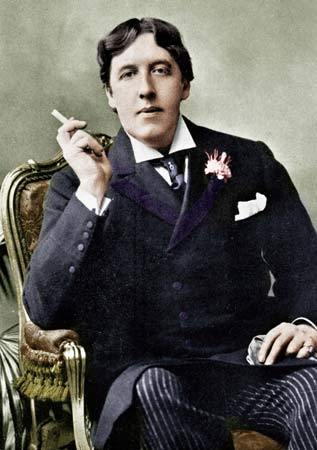
1900 – On this date, Oscar Wilde, Irish writer, wit and raconteur died (b.1854); Prison, after his conviction for "gross indecency," was unkind to Wilde's health and after he was released on May 19, 1897 he spent his last three years penniless, in self-imposed exile from society and artistic circles. He went under the assumed name of Sebastian Melmoth, after the famously "penetrated" Saint Sebastian and the devilish central character of Wilde's great-uncle Charles Robert Maturin's gothic novel Melmoth the Wanderer.
Nevertheless, Wilde lost no time in returning to his previous pleasures. According to Lord Alfred Douglas, Robbie Ross "dragged [him] back to homosexual practices" during the summer of 1897, which they spent together in Berneval. After his release, he also wrote the famous poem The Ballad of Reading Gaol.
Wilde spent his last years in the Hôtel d'Alsace, now known as L'Hôtel, in Paris, where he was notorious and uninhibited about enjoying the pleasures he had been denied in England. Again according to Douglas, "he was hand in glove with all the little boys on the Boulevard. He never attempted to conceal it." In a letter to Ross, Wilde laments, "Today I bade good-bye, with tears and one kiss, to the beautiful Greek boy. . . he is the nicest boy you ever introduced to me."
Just a month before his death he is quoted as saying, "My wallpaper and I are fighting a duel to the death. One or other of us has got to go." His moods fluctuated; Max Beerbohm relates how, a few days before Wilde's death, their mutual friend Reginald 'Reggie' Turner had found Wilde very depressed after a nightmare.
"I dreamt that I had died, and was supping with the dead!"
"I am sure," Turner replied, "that you must have been the life and soul of the party." Reggie Turner was one of the very few of the old circle who remained with Wilde right to the end, and was at his bedside when he died. On his deathbed he was received into the Roman Catholic church. Wilde died of cerebral meningitis on November 30, 1900.
Wilde was buried in the Cimitiere de Bagneaux outside Paris but was later moved to Père Lachaise in Paris. His tomb in Père Lachaise was designed by sculptor Sir Jacob Epstein, at the request of Robert Ross, who also asked for a small compartment to be made for his own ashes. Ross's ashes were transferred to the tomb in 1950. The numerous spots on it are lipstick traces from admirers.
The modernist angel depicted as a relief on the tomb was originally complete with male genitals. They were broken off as obscene and kept as a paperweight by a succession of Père Lachaise cemetary keepers. Their current whereabouts are unknown. In the summer of 2000, intermedia artist Leon Johnson performed a forty minute ceremony entitled Re-membering Wilde in which a commissioned silver prosthesis was installed to replace the vandalized genitals.
Note: As a general rule, this site does not list persons' death dates - unless their death was something out of the ordinary, a reason for them to be remembered, or because we don't know their date of birth. However, Oscar Wilde desreves special treatment. His name is referenced in this collection of brief biographies far more than any other person. His life, trial, and death had a world-wide effect on gay history.

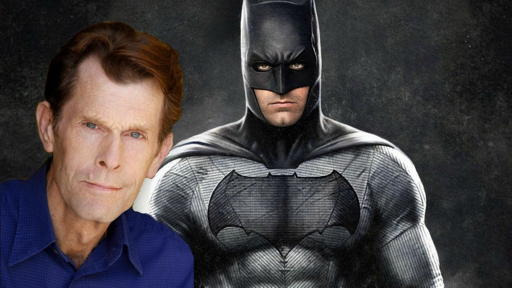
1955 – Kevin Conroy was an American actor and voice actor (d.2022). He is best known for his voice role as the DC Comics character Batman on the 1990s Warner Bros. television show Batman: The Animated Series, as well as various other TV series and feature films in the DC animated universe.
Due to the popularity of his performance as Batman, Conroy went on to voice the character for multiple films under the DC Universe Animated Original Movies banner, the critically acclaimed Batman: Arkham video games, and in fall 2019 he will play a live action Bruce Wayne in the Arrowverse adaptation of Crisis on Infinite Earths.
Conroy was born in Westbury, New York. Conroy was born into an Irish Catholic family which moved to Westport, Connecticut when he was about 11 years old. He moved to New York City in 1973 when he earned a full scholarship to attend Juilliard's drama division, studying under actor John Houseman. While there, he roomed with Robin Williams, who was in the same group as both Conroy and Kelsey Grammer.
After graduating from Juilliard in 1978, he toured with Houseman's acting group The Acting Company, and the following year he went on the national tour of Ira Levin's Deathtrap.
Filmreference.com listed Conroy as having been married, and having a child, though an interview with The New York Times in 2016 stated that he was single. He also said that he was gay.
In the 2016 interview with The New York Times promoting the animated adaptation of The Killing Joke, Conroy revealed that he was gay. As part of DC Comics' 2022 Pride anthology, Conroy wrote "Finding Batman", a story that recounted his life and experiences as a gay man. It received critical acclaim upon release. He was married to Vaughn C. Williams at the time of his death.
Conroy made an effort to conceal his homosexuality throughout most of his career. He spoke in "Finding Batman" about the discrimination he faced once potential collaborators and employers found out about his homosexuality. Conroy has said that on multiple occasions he had been removed from consideration for acting jobs due to his sexual orientation.

1995 – The first US. government-sponsored advertising targeting gay men debuts on the eve of World AIDS Day when the Centers for Disease Control and Prevention releases a public service television announcement cautioning men to have “smart sex.”

Today's Gay Wisdom:
The wit of Oscar Wilde
A cynic is a man who knows the price of everything but the value of nothing.
Moderation is a fatal thing. Nothing succeeds like excess.
There are only two kinds of people who are really fascinating: people who know absolutely everything, and people who know absolutely nothing.
To lose one parent, Mr Worthing, may be regarded as a misfortune; to lose both looks like carelessness.
We are all in the gutter, but some of us are looking at the stars.
An idea that is not dangerous is unworthy of being called an idea at all.
Education is an admirable thing, but it is well to remember from time to time that nothing that is worth knowing can be taught.
One should absorb the colour of life, but one should never remember its details. Details are always vulgar.
The truth is rarely pure and never simple.
Children begin by loving their parents; after a time they judge them; rarely, if ever, do they forgive them.
Experience is simply the name we give our mistakes.
Illusion is the first of all pleasures.
All bad poetry springs from genuine feeling.
It is better to be beautiful than to be good. But... it is better to be good than to be ugly.
There is nothing so difficult to marry as a large nose.
Keep love in your heart. A life without it is like a sunless garden when the flowers are dead.
Laughter is not at all a bad beginning for a friendship, and it is far the best ending for one.
There is only one thing in life worse than being talked about, and that is not being talked about.
Now that the House of Commons is trying to become useful, it does a great deal of harm.
The difference between literature and journalism is that journalism is unreadable and literature is not read.
Life imitates art far more than art imitates Life.
It's not whether you win or lose, it's how you place the blame.
The old believe everything, the middle-aged suspect everything, the young know everything.
America had often been discovered before Columbus, but it had always been hushed up.
There is no sin except stupidity.
It is only the modern that ever becomes old-fashioned.
A cigarette is the perfect type of a perfect pleasure. It is exquisite, and it leaves one unsatisfied. What more can one want?
Only the shallow know themselves.
Every saint has a past and every sinner has a future.
He hadn't a single redeeming vice.
A pessimist is one who, when he has a choice of two evils, chooses both.
Whenever people agree with me I always feel I must be wrong.


17 notes
·
View notes
Text
"Enemies comes here saying they want to "free" us, but they only steal our land for themselves"
The song, amazingly (actually, no, not surprising at all), is more than ONE HUNDRED YEARS OLD.
"Through steppes" - Ukrainian folk song written during its war for Independence from the Russian Yoke, after the Russian Tsardom Empire fell in the early 20th century.
youtube
Hey! Through steppes, through dark ravines,
Iron regiments are marching forth.
Let all the brave men join us!
We will become knights, oh young ones!
We don't want to fight for another's cause,
We don't want to fight as hired soldiers -
We all live only for our Ukraine,
Only for her, we would give our necks.
Enemies comes here saying they want to "free" us,
But they only steal our land for themselves.
Well, they will have land - where their graves are going to be,
Upon them, our freedom will be blossoming!
Fly, our song! Fly far under the blue skies!
Sing to the hearts of all Ukrainians!
Let our freedom always be with us!
Let the end come to all the enemy plans!
That war would turn out a failure.
Much like Ichkeria 80 years later would, Ukraine, fighting alone, lost and was occupied by Russian army, instilling a loyal puppet government and occupying Ukraine for another 80 years - until the Soviet Union, an economic and military failure by then, collapsed in on itself, which let Ukraine - and other states Russia had captured - to declare its independence again in 1991.
It is important to understand that it was never a design of the Russian elites - it was never what they wanted, they simply had no choice and no power at that time to stop the other nations from freeing themselves.
But as soon as they were able, they went on to "collecting" the lands they lost.
First, Ichkeria - a weaker state a still weak after the Soviet collapse Russia could handle back then. Russians burned and bombed its capital to the ground, mass killing many civilians and completely occupying the territory now known as Chechnya.
Then, a try at Moldova (part of Moldova's lands are now occupied by Russian mercenary army).
Then, a try at Georgia (part of Georgia lands are now occupied by Russian mercenary army).
In 2014 a try at Ukraine (part of our territory - my home region actually - had been and is now occupied by Russian mercenary army, but after the full invasion of 2022, Russian regular army is also stationed there now🙄).
Now, in 2022 a full invasion of Ukraine.
What you knew of Russia is a lie.
A propaganda they fed you.
Russia always was and is a colonialistic empire.
It has subjugated and erased nations for centuries.
Have you never wondered HOW EXACTLY IT HAS GOTTEN THIS BIG A TERRITORY?????
The total number of nationalities and ethnicities in Russia is probably bigger than the number of minorities in the US.
THOSE ARE ALL THEIR LANDS.
Moreover, they all mostly still live on them (i.e. it's not like a united country where all nationalities mingle completely).
Yes, there are also white people there in those lands - many of them ethnical Ukrainians actually who already forgot their ancestry. And you know why? BECAUSE THEY WERE DISPLACED THERE!!!!
Russians, after occupying a territory, did this thing to hold power there - they forcibly took those who resisted and forcibly SENT THEM TO LABOR CAMPS they instilled in a far off land of Asian ethnicities (like, half of the world far off lands) - which they captured earlier. On the other hand, they encouraged their own white Russian settlers to come to this European beautiful warm country Ukraine and settle in the homes of displaced Ukrainians🤷🏻
They did send Russians also to those cold northern Asian and Middle-East lands - convicts, prisoners, dissidents, etc. - all those who the regime deemed as unsavory and broken - that the only their worth, as the regime thought, was to serve in a labor camp to "bring culture and language" to "uneducated savages" who lived there (those be the Asian many ethnicities whose lands they captured) - direct quote there. I still see and hear MODERN Russians calling people of those ethnicities "ungrateful" if they say anything bad about Russia - because apparently "Russia brought them up from the dirt - gave them culture, education, taught them to read and write"🙄🙄🙄🤦🤦🤦 (this is so funny actually - because many of those lands are descendants of the Mongol Empire - which was prosperous and powerful when Moscow didn't even exist yet🤣 And when Moscow did exist - it existed as a small, weak, rural 'dutchy' which paid tributes to the great Mongol Empire. It's like saying that Saxons (no offense to Saxons but still, Saxons were awesome but Roman Empire was awesome-r) brought culture and language and education to Italians, because many Italians can speak English now)
All in all, Russia had many "funny" ways of managing the population.
64 notes
·
View notes
Text
A trial ballon has gone up on the NBCnews website. It is testing the public reaction to the upcoming U.S. and NATO acknowledgment of their defeat in Ukraine:
U.S., European officials broach topic of peace negotiations with Ukraine, sources say - NBCnews - Nov 03 2023
WASHINGTON — U.S. and European officials have begun quietly talking to the Ukrainian government about what possible peace negotiations with Russia might entail to end the war, according to one current senior U.S. official and one former senior U.S. official familiar with the discussions.
This comes the same week that saw a Time piece about Zelenski's unwillingness to consider the real situation on Ukraine and to admit defeat. The same week the Economist interviewed General Zaluzny who optimistically spoke of a stalemate at the front even while his army is on the cusp of disintegration.
Taken together the three pieces might well be part of a U.S. administration campaign to concede its defeat in Ukraine while blaming its Ukrainian proxy forces for the results of its blunder.
Back to the NBC piece:
The conversations have included very broad outlines of what Ukraine might need to give up to reach a deal, the officials said. Some of the talks, which officials described as delicate, took place last month during a meeting of representatives from more than 50 nations supporting Ukraine, including NATO members, known as the Ukraine Defense Contact Group, the officials said.
The discussions are an acknowledgment of the dynamics militarily on the ground in Ukraine and politically in the U.S. and Europe, officials said.
They began amid concerns among U.S. and European officials that the war has reached a stalemate and about the ability to continue providing aid to Ukraine, officials said. Biden administration officials also are worried that Ukraine is running out of forces, while Russia has a seemingly endless supply, officials said. Ukraine is also struggling with recruiting and has recently seen public protests about some of President Volodymyr Zelenskyy’s open-ended conscription requirements.
The problem of the Ukrainian army is an obvious one. It is running out of men and has few it can still recruit. It is difficult to assess the real losses the Ukrainian military has had, but I would not be astonished to learn that they sum up to about 300,000 dead and some 500,000+ wounded, many of whom will now be disabled.
Finally these concerns about Ukraine's manpower get acknowledged:
President Joe Biden has been intensely focused on Ukraine’s depleting military forces, according to two people familiar with the matter.
"Manpower is at the top of the administration’s concerns right now,” one said. The U.S. and its allies can provide Ukraine with weaponry, this person said, “but if they don’t have competent forces to use them it doesn’t do a lot of good”
The last sentence seems to be taken from the Time piece which had said:
In some branches of the military, the shortage of personnel has become even more dire than the deficit in arms and ammunition. One of Zelensky’s close aides tells me that even if the U.S. and its allies come through with all the weapons they have pledged, “we don’t have the men to use them.”
Ukraine itself is destroying its own brigades faster than it can generate new ones:
During the last days tanks from the 47th brigade (Leo 2) and 10th mountain brigade (T-64BM/BV) have been seen, and were destroyed, near Avdiivka. Both brigades had only recently been mauled during their hopeless attacks at the southern front. It does not make sense to throw what is left of them into another battle without reconstituting them. The whole experience and knowledge these brigades had gained will be lost with them.
The whole professional middle-block of the army, the sergeants and young officers, have mostly been killed or wounded. Without them it is impossible to constitute new forces.
The NBC piece has made news in Ukraine (in Russian) but I have yet to find Ukrainian reactions to it. While I was publishing this a first political reaction, total denial, appeared:
Zelenskyy: There is no stalemate, and there will be no talks or concessions - UA Pravda - Nov 4 2023
Ukrainian President Volodymyr Zelenskyy does not think the situation on the front in Ukraine is a stalemate and has said that Ukraine will not negotiate with Russia.
...
Quote from Zelenskyy: "This is not a stalemate. Russia controls the sky. We are protecting our troops. No one [in Ukraine] wants to just throw our people [into the battle] like Russia does [...]
How can we overcome it? With the F-16s, we have to wait for our guys to get trained and for them to come back. When there’s air defence on the front, our soldiers advance, and they deploy the equipment they have."
What will he say when the F-16s, the fifty year old wunderwaffen, fall out of the sky faster than they go up?
There are sure signs that the divide between the political and military leadership in Ukraine is growing. President Zelenski, on request of his new defense minister, just removed the commander of Ukraine's special forces and installed a new one:
Major General Viktor Khorenko does not know the reasons for his dismissal from the post of Commander of the Special Operations Forces. Valerii Zaluzhnyi, Commander-in-Chief of the Armed Forces of Ukraine, did not submit a request for his dismissal.
It is very unusual to fire an officer without a request from his superior commander.
There are also shots fired against Zaluzny himself:
President's Office advises Commander-in-Chief of Ukrainian Armed Forces not to publicise situation at front - UA Pravda - Nov 4 2023
Ihor Zhovkva, Deputy Head of the Office of the President, commenting on the article by Valerii Zaluzhnyi, the Commander-in-Chief of Ukraine's Armed Forces, for The Economist, has said that the military should not bring to the public what is happening at the front.
...
Zhovkva also stated that "one of the heads of the leaders' offices" called him after the mentioned article was published.
"And they simply ask me in a panic, ‘What should I report to my leader? Are we really at a stalemate?’. Are we trying to achieve this effect with this article?", the President’s Office representative said.
The NBC piece even sets a time frame to Ukraine to admit that it is over:
Officials also have privately said Ukraine likely only has until the end of the year or shortly thereafter before more urgent discussions about peace negotiations should begin. U.S. officials have shared their views on such a timeline with European allies, officials said.
Russia will likely agree to peace talks. But it probably will demand more than Ukraine is willing to give. At a minimum that is the full control over the five oblast it has annexed, including Crimea, and no NATO relations with Ukraine. The current Ukrainian parliament will probably reject those requests which will then lead to further Russian demands.
Kiev has yet to acknowledge reality. The Ukrainian state has been bleeding out - financially as well as physically. Its masters have found that their aim at the start of the war - to weaken Russia - has led to the opposite. Russia now has a bigger and better armed military with more real war experience than any of its possible opponents.
Russia has won.
7 notes
·
View notes
Text
when: narrative
A brief overview of the history of Mecklenburg, from 1890 to 2006.
Means the person is a sole creation of me.

Heinrich Ludwig I, King of Mecklenburg, (born 26 January 1890) only child of Duke Johann Albrecht of Mecklenburg-Schwerin and Princess Elisabeth Sybille of Saxe-Weimar-Eisenach.
Princess Elisabeth Sybille died in 1908 when Heinrich Ludwig was eighteen years old. His mother was first cousin to Queen Wilhelmina of the Netherlands, making Wilhelmina his maternal first cousin once removed. Wilhelmina married Heinrich Ludwig’s paternal half-uncle, Duke Heinrich of Mecklenburg-Schwerin, making Queen Juliana of the Netherlands his half-paternal first cousin and his maternal second cousin. The events of WWII solidified the bonds between the House of Mecklenburg and the House of Orange.
Heinrich Ludwig’s father remarried in 1909 to Princess Elisabeth of Stolberg-Rossla, they would have no children and Heinrich Ludwig remained an only child.
Heinrich Ludwig’s father had been the regent for his nephew, Friedrich Franz IV, Grand Duke of Mecklenburg-Schwerin, from 1897 to 1901.
In 1915, aged twenty-five, Heinrich Ludwig, who was fourth in line to inherit the throne, overthrew his cousin, Friedrich Franz IV, along with the support of several family members due to Mecklenburg’s involvement in WWI. Grand Duke Friedrich Franz IV abdicated on 3 November 1915 and renounced the succession rights of his two sons. Heinrich Ludwig’s father also renounced his succession rights, this time in favour of his son, who then became the Grand Duke of Mecklenburg-Schwerin. Heinrich Ludwig recalled his troops and reinforced the border with Prussia. Mecklenburg effectively changed sides and begun supplying Entente troops (with little effect but the gesture was appreciated).
In early 1918, the Grand Duke of Mecklenburg-Strelitz committed suicide and Heinrich Ludwig took control of the grand duchy as the current heir was serving in the Russian Army and would later renounce his claim to the throne (the only surviving male-line was of morganatic descent and ineligible to inherit at the time).
When the German Empire and her allies lost the war in November 1918, Mecklenburg-Schwerin and Mecklenburg-Strelitz celebrated their victory.
Heinrich Ludwig had fallen for the young Princess Karola of Urach prior to the outbreak of WWI and intended to marry her. She was a member of a morganatic branch of the Royal House of Württemberg, but her mother had been a Duchess in Bavaria and Heinrich Ludwig deemed this royal connection to be strong enough to overcome the fact that her immediate family did not rule over a country.
Princess Karola was born Catholic and remained a Catholic for the rest of her life. Karola and Heinrich Ludwig married on 2 January 1919.
In the Treaty of Versailles of 1919, the Grand Duchies of Mecklenburg-Schwerin and Mecklenburg-Strelitz were joined to create the Kingdom of Mecklenburg. Heinrich Ludwig was now King and Karola his Queen.
The King and Queen now needed an heir, or several. The other men in the family had only daughters and women were not able to inherit.
A son and Crown Prince, Paul Friedrich, was born 10 September 1919, nine months after his parents wedding. A daughter, Marie Elisabeth, was born on 1 November 1921. There would be no further children.
Heinrich Ludwig and his family were popular. They were accommodating to the former Grand Ducal Family, allowing them to remain in their palaces for life, with the intention of inheriting the lands after their deaths. Instead of using Schweriner Schloss or Schloss Ludwigslust as his residence, Heinrich Ludwig had built a grand palace between Bad Doberan and Rostock, having moved the country’s capital to Rostock. He named the palace Euphemiasburg, after his ancestress Euphemia of Sweden.
Mecklenburg flourished in the years between WWI and WWII, they had not been sanctioned as the rest of the former German Empire had been and despite the troubles brought on by the Great Depression, became a minor power in Europe and an important member of central Europe, enjoying close ties with her neighbours and Baltic friends, especially Denmark and Poland.
However, there were groups of people, including governments of foreign countries who were uncomfortable with the existence of the Kingdom of Mecklenburg and her powerful King. Mecklenburg was a constitutional monarchy and had been since 1916, but Heinrich Ludwig I owned half the country as his personal property, had considerable executive powers and used them frequently to intercede with government affairs as an executive monarch and de facto upper house of government.
There were also calls for Mecklenburg to reunite with Germany. This notion became more popular after the rise of the Nazi Party, which attracted a considerable following in Mecklenburg from the early 1930s.
On 1 June 1938, the German Ambassador to Mecklenburg sent word to the King that Germany was mobilising its troops and that Mecklenburg would be occupied by morning on 2 June. The King had his children evacuate to Denmark where the former Grand Duke’s sister was Queen Consort. The former Grand Duke’s eldest daughter, Duchess Thyra of Mecklenburg-Schwerin, joined her second cousins in Denmark as she and Paul Friedrich were courting and did not want to be parted.
King Heinrich Ludwig I decided to remain in Mecklenburg to dissuade his cousin the former Grand Duke and his cousins’ sons from seeking the throne of Mecklenburg, or from being used as a puppet by Nazi Germany.
The Kingdom would be occupied by Nazi Germany for nearly seven years. The King and Queen were moved from Euphemiasburg to Schweriner Schloss and lived with the former Grand Duke and Duchess during the occupation. The King’s Government was able to function normally until 1940 when Mecklenburg was officially annexed by Nazi Germany. The country’s capital was moved back to Schwerin in 1940 where it remains to this day.
The former Grand Duke’s eldest son had joined the SS in 1931, and would be among those occupying Denmark from 1940 and disowned in 1943. The former Grand Duke’s second son and youngest daughter remained in Mecklenburg for the duration of the war.
When Great Britain declared war on Germany on 1 September 1939, Paul Friedrich, his sister Marie Elisabeth and Duchess Thyra fled to London as they feared that continental Europe was no longer safe. They remained in England for the rest of the war.
Paul Friedrich and Thyra were married at Windsor Castle on 2 October 1939. King George VI, Queen Elizabeth, Princess Elizabeth and Princess Margaret were among the guests.
Crown Princess Thyra would give birth to three daughters, also at Windsor Castle, Heinrike Franziska, on 4 June 1940, Elisabeth Mathilde, on 23 January 1942 and Marie Anastasia, on 12 October 1944.
King Heinrich Ludwig and Queen Karola learnt of their ever growing family through weekly BBC broadcasts given by their only son. King Heinrich Ludwig, faced with the possibility that he and his wife would not survive the German occupation, issued a royal decree changing the laws of succession to allow women to inherit the throne by male-preference primogeniture. In addition to this, he granted his children and grandchildren nominal dukedoms in the same way Sweden granted royal dukedoms.
From 1940 to 1945, the line of succession was:
Crown Prince Paul Friedrich, Duke of Rostock, son of King Heinrich Ludwig I
Princess Heinrike Franziska, Duchess of Ratzeburg, first daughter of the Crown Prince
Princess Elisabeth Mathilde, Duchess of Güstrow, second daughter of the Crown Prince
Princess Marie Anastasia, Duchess of Grevesmühlen, third daughter of the Crown Prince
Princess Marie Elisabeth, Duchess of Parchim, daughter of King Heinrich Ludwig I
The strong bond formed between the House of Mecklenburg and the House of Windsor during the War, and the Blitz especially, continues to this day.
After the defeat and surrender of the German forces in early May 1945, Crown Prince Paul Friedrich, Crown Princess Thyra and their children, and Princess Marie Elisabeth returned to Mecklenburg in late May, only days before Heinrike Franziska’s fifth birthday.
The King and Queen were overjoyed to see their children again and meet their grandchildren for the first time. The House of Mecklenburg had survived the war relatively unscathed.
Mecklenburg, however, did not. When the Red Army advanced through central Europe, Mecklenburg grew nervous, worried that they would be left behind by the Allies. However, some of their Baltic ports were deemed important enough to the UK, USA, and France to stand up to Russia and approximately 40% of Mecklenburg was lost to the Soviets in 1945 and the Kingdom would remain split in two until 1990.
The former Grand Duke, Friedrich Franz IV died on 17 November 1945. Heinrich Ludwig and Karola took possession of Schweriner Schloss as their pre-occupation home Euphemiasburg was now only miles from the Eastern German border. The former Grand Duchess took up residence at Schloss Ludwigslust, where she would remain until her death in 1963. She lived to see her son-in-law ascend the throne and for her eldest daughter to become Queen Consort.
Crown Prince Paul Friedrich and Crown Princess Thyra would have several more children.
Another daughter, Cecilie Auguste, Duchess of Ludwigslust, was born on 23 September 1947.
A son, Wilhelm Franz, Duke of Schwerin, was born on 17 July 1949, and was now second in line to inherit the throne after his father.
A fifth daughter, Alexandrine Luise, Duchess of Waren, was born on 18 March 1951.
A second son, Albrecht Gustav, Duke of Bad Doberan, was born on 7 October 1953.
In 1949, the King and Queen’s only daughter, Marie Elisabeth married Prince Gorm of Denmark, a grandson of Christian IX of Denmark, and they would have two children Harald, in 1953 and Feodora in 1955.
The first King of Mecklenburg died on 18 November 1954. His son ascended the throne as Paul Friedrich II of Mecklenburg with Thyra as his Queen Consort.
The new King and Queen would have one final child, Ingrid Sophie, Duchess of Teterow, born on 9 June 1955.
The new King and Queen were coronated at Schwerin Cathedral in 1956.
In 1956, the line of succession was:
Crown Prince Wilhelm Franz, Duke of Schwerin, first son of King Paul Friedrich II
Prince Albrecht Gustav, Duke of Bad Doberan, second son of King Paul Friedrich II
Princess Heinrike Franziska, Duchess of Ratzeburg, first daughter of King Paul Friedrich II
Princess Elisabeth Mathilde, Duchess of Güstrow, second daughter of King Paul Friedrich II
Princess Marie Anastasia, Duchess of Grevesmühlen, third daughter of King Paul Friedrich II
Princess Cecilie Auguste, Duchess of Ludwigslust, fourth daughter of King Paul Friedrich II
Princess Alexandrine Luise, Duchess of Waren, fifth daughter of King Paul Friedrich II
Princess Ingrid Sophie, Duchess of Teterow, sixth daughter of King Paul Friedrich II
Princess Marie Elisabeth, Duchess of Parchim, daughter of late King Heinrich Ludwig I
Prince Harald of Denmark, son of Princess Marie Elisabeth
Princess Feodora of Denmark, daughter of Princess Marie Elisabeth
The line of succession was well secured, and the royal family’s standing within Mecklenburg would be credited with maintaining the stability of the small Kingdom.
The King and Queen enjoyed enormous popularity and a very happy home life. According to the rules of succession, their children were only allowed to marry people from royal or noble families and from the early 1970s, their daughters began marrying foreign born princes and having children of their own.
Queen Karola outlived her husband by several years and was able to see several of her great-grandchildren born before she died in 1980, aged 83.
Unknown to the family at the time, but 1980 was the beginning of several years of loss and difficulty for the family.
Queen Thyra died suddenly on 27 September 1981 following a severe heart attack. The country, still reeling from the death of their beloved Karola, was plunged into mourning once more. King Paul Friedrich II was beside himself with grief and the trouble concerning his youngest son wasn’t doing his health any favours.
In 1981, the Crown Prince, now 32 years old, was still unmarried and his younger brother, Albrecht Gustav, had set his sights on Veronica Doncaster, an American born commoner with Mecklenburgish ancestry. The King disapproved and refused to declare such a marriage dynastic or relax the rules regarding the line of succession. If Albrecht Gustav and Veronica were to marry, the Prince would lose his place in the line of succession for himself and his descendants, and any children would not be able to inherit the many titles used by the Royal House of Mecklenburg.
King Paul Friedrich II of Mecklenburg died 12 January 1982, outliving his wife by only a few months.
His eldest son ascended the throne as King Wilhelm Franz I of Mecklenburg. Albrecht Gustav was now his brother’s heir presumptive.
Wilhelm Franz did not have any problem with members of his family marrying commoners and changed the rules of succession and the house rules to allow unequal marriages. Albrecht Gustav and Veronica were married at Schwerin Cathedral on 29 August 1982. Veronica became a Princess of Mecklenburg and Duchess of Bad Doberan. The public, who had been supportive of their prince marrying a commoner, were thrilled and hundreds of thousands of people lined the streets of Schwerin to celebrate the wedding.
Albrecht Gustav and Veronica became parents on 27 May 1983, when a son, Paul Ludwig was born. They would have another child, Marie Leopoldine, born 3 February 1985, before moving to Canada in August 1985 to serve as Mecklenburg’s Ambassador to Canada. A further two children would be born while living in Canada, Christian Franz, born 7 March 1987 and Marie Josefine, born 27 January 1989.
In 1981, at the wedding of his cousin Prince Harald of Denmark to Duchess Helene of Oldenburg, King Wilhelm Franz I met the bride’s cousin, Princess Eleonora of Leiningen. Eleonora, born 12 May 1961, was almost thirteen years younger than the King, but they began a relationship in late 1981 and became engaged in 1984. When the couple were married in October 1985, the small Kingdom hosted a celebration like none they had seen in decades.
The new Queen settled into her role, supporting her husband and charitable causes in the years leading up to the collapse of the Soviet Union.
The King and Queen welcomed their first child, Karolina Augusta, Duchess of Elde, on 15 September 1988. From the young princess’s birth there was rumblings of changing the laws of succession to allow the eldest child to inherit regardless of gender.
On 15 September 1989, Karolina Augusta’s first birthday, the King granted his daughter the title Duchess of Rostock (a title previously held by her grandfather, King Paul Friedrich II) and announced his intention to change the laws of succession from 1 January 1990 among his descendants to absolute primogeniture and thus his daughter would become Crown Princess and the heiress apparent.
So, on 1 January 1990, King Wilhelm Franz I issued a royal decree changing the laws of succession and his daughter became the Crown Princess of Mecklenburg and the first heiress apparent in the country’s almost 900 year history.
Following the fall of the Soviet Union, the former lands of Mecklenburg were reunited and a referendum held on 14 October 1990 led to the incorporation of the lands of Vorpommern, almost doubling the size of the Kingdom of Mecklenburg. On 15 October, King Wilhelm Franz I announced that to honour Vorpommern he had changed his eldest daughter’s surname from von und zu Mecklenburg to von und zu Mecklenburg-Vorpommern. Karolina Augusta was now the head and founder of the House of Mecklenburg-Vorpommern, designated as a branch of the House of Mecklenburg.
From late 1990, the King and Queen started the long and arduous task of rebuilding their nation and welcoming their new subjects into a thoroughly western nation after decades of Soviet rule.
During an annual ski holiday to Switzerland, the King died following a skiing accident on 20 January 1992. Wilhelm Franz was only forty-two years old and had reigned for just over ten years.
His only child ascended the throne as Queen Karolina Augusta I of Mecklenburg. She was three and a half years old.
Queen Eleonora, who was seven months pregnant, was declared regent on 21 January 1992 by the Council of the Royal House and Family of Mecklenburg. The late King’s younger brother, Albrecht Gustav, who had been serving as the Mecklenburgish Ambassador to Canada, attempted to have himself declared regent, but was unsuccessful. Albrecht Gustav became resentful and refused to return to Mecklenburg once his term as Ambassador to Canada finished in 1993.
Queen Eleonora, now aged thirty-one, gave birth to a son, Klaus Wilhelm, Duke of Havel, on 12 March 1992.
The regency would last over fourteen years, until Karolina Augusta turned eighteen on 15 September 2006.
The rules regarding the line of succession where changed further in late 2006, to overturn the rule only allowing Protestants. This allowed the Catholic children of Princess Feodora into the line of succession.
The line of succession was now:
Prince Klaus Wilhelm, Duke of Havel
Prince Albrecht Gustav, Duke of Bad Doberan
Prince Paul Ludwig of Mecklenburg
Prince Christian Franz of Mecklenburg
Princess Marie Leopoldine of Mecklenburg
Princess Marie Josefine of Mecklenburg
Princess Heinrike Franziska, Duchess of Ratzeburg
Princess Elisabeth Mathilde, Duchess of Güstrow
Prince Ludwig of Hohenlohe-Langenburg
Princess Juliana of Hohenlohe-Langenburg
Princess Lucinda of Hohenlohe-Langenburg
Prince Konstantin of Hohenlohe-Langenburg
Princess Marie Anastasia, Duchess of Grevesmühlen
Prince Karl Viktor of Hesse-Kassel
Prince Otto of Hesse-Kassel
Prince Ernst Albert of Hesse-Kassel
Prince Nikolaus Emmanuel of Hesse-Kassel
Princess Cecilie Auguste, Duchess of Ludwigslust
Prince Friedrich Magnus of Schwarzburg
Princess Anne Therese of Schwarzburg
Princess Alexandrine Luise, Duchess of Waren
Princess Ingeborg of Schleswig-Holstein-Sonderburg-Glücksburg
Princess Sigrid of Schleswig-Holstein-Sonderburg-Glücksburg
Princess Ingrid Sophie, Duchess of Teterow
Princess Marie Elisabeth, Duchess of Parchim
Prince Harald of Denmark
Prince Oskar of Denmark
Prince Axel of Denmark
Princess Louisa of Denmark
Princess Feodora of Liechtenstein
Prince Adam Karl of Liechtenstein
Prince Peter Gregor of Liechtenstein
Princess Bernadette Sophia of Liechtenstein
Princess Johanna Eleonore of Liechtenstein
2 notes
·
View notes
Photo

LETTERS FROM AN AMERICAN
February 20, 2023
Heather Cox Richardson
We awoke this morning to news that President Joe Biden was in Kyiv, Ukraine, where he pledged “our unwavering and unflagging commitment to Ukraine’s democracy, sovereignty, and territorial integrity.” Air raid sirens blared as Biden and Ukraine president Volodymyr Zelensky walked through the streets during the U.S. president’s five-hour stay.
As National Security Advisor Jake Sullivan told reporters, Biden’s visit was the first time a U.S. president has visited “the capital of a country at war where the United States military does not control the critical infrastructure”…in other words, an active war zone. Biden traveled in a special mission plane from Germany to Poland, then took a train from Poland to Kyiv. To make sure there would be no attacks, the U.S. notified the Russians that Biden would be in Kyiv, but a Russian MiG 30 flew from Belarus during Biden’s visit, triggering air raid sirens.
According to Sullivan, Biden felt it was important to visit Kyiv at the anniversary of the 2022 Russian invasion. The image of Biden and Zelensky standing together sent a message to Russian president Vladimir Putin, as David Rothkopf put it in the Daily Beast: “I am here in Kyiv and you are not. You not only did not take Kyiv in days as some predicted, but your attack was rebuffed. Your army suffered a humiliating defeat from which it has not recovered.”
Just under a year ago, the global equation looked very different. On February 4, 2022, Chinese president Xi Jinping hosted Russian president Vladimir Putin on the opening day of the Winter Olympics. The two men pledged to work together in a partnership with “no limits” in a transparent attempt to counter U.S. global leadership and assert a new international order based on their own authoritarian systems.
At the time, Russia was massing troops on its border with Ukraine but fervently denied it was planning to invade. On February 24, 2022, Russian tanks rolled across the border and Russian planes covered them in the air. Biden remembered that Zelensky called him and said he could hear the explosions as they spoke. “I’ll never forget that,” Biden said. “The world was about to change.” When Biden asked what he could do to help, Zelensky said: “Gather the leaders of the world. Ask them to support Ukraine.”
And over 50 nations stepped up to make sure the rules-based international order in place since World War II, which prevents one country from attacking another, held. Those backing Ukraine against Russian aggression have squeezed Russia with economic sanctions and supported Ukraine with military and humanitarian aid. As Biden said today, standing next to Zelensky: “Kyiv stands and Ukraine stands. Democracy stands. The Americans stand with you, and the world stands with you.”
Biden pledged another $460 million in aid to Ukraine, emphasizing that U.S. support for the country is bipartisan.
Biden mourned the cost Ukraine has had to bear, but championed its successes. “Russia’s aim was to wipe Ukraine off the map,” Biden said, but “Putin’s war of conquest is failing. Russia’s military has lost half its territory it once occupied. Young, talented Russians are fleeing by the tens of thousands, not wanting to come back to Russia. Not…just fleeing from the military, fleeing from Russia itself, because they see no future in their country. Russia’s economy is now a backwater, isolated and struggling.”
“Putin thought Ukraine was weak and the West was divided,” Biden said. He remembered telling Zelensky that Putin was “counting on us not sticking together. He was counting on the inability to keep NATO united. He was counting on us not to be able to bring in others on the side of Ukraine.” While Biden didn’t say it, Putin had reason to think those things: the four years of the Trump administration had seen the U.S. offending allies and threatening to pull out of NATO, the North Atlantic Treaty Organization that stands against Russian aggression.
“He thought he could outlast us,” Biden said. “I don’t think he’s thinking that right now…. [H]e’s just been plain wrong. Plain wrong.” A year later, Biden said, “We stand here together.”
“You and all Ukrainians…remind the world every single day what the meaning of the word ‘courage’ is—from all sectors of your economy, all walks of life. It’s astounding. Astounding.
You remind us that freedom is priceless; it’s worth fighting for for as long as it takes. And that’s how long we’re going to be with you, Mr. President: for as long as it takes.”
Zelensky answered, “We’ll do it.”
The world could stand behind Ukraine as it has because Biden and Secretary of State Antony Blinken have held a coalition together and presented a united front with Zelensky and allies and partners in defense of democracy.
In contrast today, Representative Marjorie Taylor Greene (R-GA) explicitly called for dividing the nation. She tweeted: “We need a national divorce. We need to separate by red states and blue states and shrink the federal government. Everyone I talk to says this.” For once I will spare you my usual lecture on how elite southern enslavers in the 1850s made this same argument because they resented the majority rule that threatened their ability to impose their will on their Black neighbors.
(I will note, though, that former representative Liz Cheney (R-WY) helpfully reviewed “some of the governing principles of America” for Greene, tweeting: “Our country is governed by the Constitution. You swore an oath to support and defend the Constitution. Secession is unconstitutional. No member of Congress should advocate secession, Marjorie.”)
What Greene had to say next is of more interest in this moment. The Munich Security Conference, the world’s largest gathering for international security discussions, has just reported that the Russian war on Ukraine is a war of authoritarianism on a rules-based international order. At that conference, Vice President Kamala Harris said the U.S. had determined that Russia has committed crimes against humanity and noted that the bipartisan U.S. delegation to the conference was the largest we have ever sent. The U.S. president has just entered a war zone to declare U.S. support for democracy and is now in Poland, where he will speak with the leaders of the nine countries that make up NATO’s eastern flank and will deliver a speech that Blinken has described as “very significant.”
In contrast, Greene echoed authoritarian leaders Viktor Orbán of Hungary and Putin himself when she called for splitting the nation over “the sick and disgusting woke culture issues shoved down our throats” and “the Democrat’s [sic] traitorous America Last policies.” Authoritarian leaders insist that the equality that underpins liberal democracy threatens traditional society because it means that LGBTQ people, women, and minorities should have the same rights as white men. Greene appears to be taking the same position.
Meanwhile, Fox News Channel personalities, including Tucker Carlson, are trying to spin Biden’s visit to Ukraine as proof that he doesn’t care about the train derailment in Ohio. Scholar of disinformation behavior Caroline Orr Bueno noted: “There’s a narrative being planted here; watch how support for Ukraine is framed as incompatible with US national interests.” She notes that a similar narrative in Canada argues that support for Ukraine hurts Canadian veterans.
A filing in Dominion Voter Systems’ lawsuit against FNC for defamation revealed last week that FNC personalities knowingly lied to their viewers about the legitimacy of the 2020 presidential election, acting as a propaganda outlet for Trump. This information is a handy backdrop for the news reported today by Mike Allen of Axios, who says that House speaker Kevin McCarthy (R-CA) has given to FNC host Carlson—who figured prominently in the election fraud lies—exclusive access to 41,000 hours of footage from the U.S. Capitol of the January 6, 2021, attempt to overturn the results of the 2020 presidential election. According to Allen, Carlson’s producers have already begun going through it to see what they can use on his show.
Putin is scheduled to address the Russian Federal Assembly tomorrow. Billboards in Russia proclaim: “Russia’s border ends nowhere,” but observers believe that he was hoping for a major victory on a battlefield in Ukraine before the speech. Instead, Russian forces have taken severe losses in their recent stalled offensive in eastern Ukraine near Bakhmut.
Biden’s speech in Poland will follow later in the day.
—
LETTERS FROM AN AMERICAN
HEATHER COX RICHARDSON
#Heather Cox Richardson#Letters From An American#Volodymyr Zelensky#Joe Biden#War in Ukriane#Authoritarian GOP#FOX News#Munich Security Conference#vp kamala harris
15 notes
·
View notes
Text
Russian anti-war activist dies after ‘fall from height’
Olga Nazarenko was well-known for her stubborn protests against the Kremlin
By James Kilner 22 October 2023 • 2:59pm
A Russian anti-war protester who became a symbol of resistance to the Kremlin has died in a mysterious fall.
Local media said that Olga Nazarenko had now died in hospital after a “fall from a height” two weeks ago that was described as an accident.
Several Kremlin opponents have been killed in falls and an anti-war activist in Rostov, southern Russia, also died this year in police custody from alleged torture.
On Facebook, tributes blamed Nazarenko’s enemies for her death.
“Cursed are the cannibals who devour our finest,” one person wrote. Another said: “Our unbending Olga. Did they kill you?”
Friends also speculated that she had fallen from a tree.
Nazarenko was well-known for her stubborn anti-war protests and had featured in several opposition media reports and videos.
Attacked in the street
She had staged weekly one-person protests, despite being regularly detained by the police. She had also been attacked in the street and had lost her job as an associate professor at a local medical university because of her protests.
Hundreds of thousands of Russians have fled since the Kremlin banned anti-war protests but Nazarenko, who was married with an adult daughter and a young son, told the US-funded Radio Free Europe/Radio Liberty that she felt that it was her duty to stay.
“Russia is my country, not just those in power and their supporters. I won’t let anyone drive me out of my country,” she said last year.
The Kremlin has shifted Russian society and its economy onto a war footing since it launched its full-scale invasion in February 2022, indoctrinating people through a wall of propaganda.
This includes promoting former fighters from the Kremlin’s Wagner mercenary unit, which recruited heavily from Russian prisons. Wagner veterans now flaunt their war medals in communities they previously terrorised as murderers and thieves.
This week, a school in the Nizhny Novgorod region of Russia said that it had hosted a Wagner veteran to talk about his experiences of fighting on the front lines.
A photo on the school’s social media channel showed the Wagner mercenary veteran wearing a full combat uniform, a balaclava and three medals standing in the classroom. In front of him was a table with a shoulder-mounted rocket launcher and then rows of children.
The school described the Wagner veteran as a war hero but failed to highlight, unlike opposition reporters, that he had also been convicted of at least two murders before he joined Wagner.
“The class meeting was very popular with seventh-grade students,” the school said.
‘Attritional grind’
In Ukraine’s eastern Kharkiv region, a Russian missile hit a post office sorting centre, killing at least six people and injuring 16. On Ukraine’s front lines, the British Ministry of Defence said that a Russian attack at Advika, a town near Bakhmut, had descended into an attritional grind.
It also said that the Russian army had now sustained up to 290,000 casualties, dwarfing the Kremlin’s war in Afghanistan, which lasted a decade through the 1980s and killed around 20,000 Soviet soldiers.
The Russian army has copied Wagner and has also been signing up convicts from Russian prisons since the start of the year to plug gaps in front-line units but now recruiters are targeting migrants, often from Central Asia.
On Friday, Russian riot police raided a mosque in a Moscow commuter town and forced the men to join the army.
3 notes
·
View notes
Text
One of the country’s poorest regions, Dagestan, is also the region that has lost the most men to the war in Ukraine.
By Nanna Heitmann and Keith Gessen
August 18, 2022
The first Russian soldier officially killed in action in Ukraine was a square-jawed twenty-five-year-old named Nurmagomed Gadzhimagomedov. According to the Ministry of Defense, he was caught in an ambush during the initial phase of the invasion and blew himself and the surrounding Ukrainians up with a grenade. When President Vladimir Putin announced that he was awarding the country’s highest honor—a Hero of Russia medal—to Gadzhimagomedov, he stressed that the senior lieutenant was from Dagestan. Putin added that, though he himself was an ethnic Russian, such heroism on the part of an ethnic minority made him proud to be “part of the powerful, strong, multiethnic people of Russia.”
In fact, the army executing Putin’s “special operation” features a striking number of young men from the ethnic republics. A Chechen battalion was highly visible, including on TikTok, in the siege of Mariupol. Ethnic Buryats and Bashkirs have been seen fighting and dying. This apparent overrepresentation of minorities is partly a function of demographic trends—but also of economic inequality and lack of opportunity in many of the areas outside the wealthy metropolises of Moscow and St. Petersburg. Because a majority of the Russian force consists of kontraktniki, or soldiers on contract, and because the contracts are relatively lucrative (as much as forty-seven hundred dollars a month, according to some sources), the men who sign up are often those who were unable to find gainful employment elsewhere.
The republic that has seen the most war dead, according to official figures—and where poverty, a martial tradition, and relative loyalty to Moscow intersect—is Dagestan. Dagestan lies at the southernmost tip of Russia, and shares a border with Chechnya, Georgia, and Azerbaijan. Situated near the Caucasian mountain range, its lands feature towering brown peaks, desert canyons, and steppes ridged by sand dunes. The republic is predominantly Muslim but incredibly multiethnic, with fourteen official languages. It’s also one of the poorest republics in the country. Though it remained loyal to Moscow throughout the Chechen drive for independence, in the nineteen-nineties, it was later gripped by a radical Islamic insurgency. As Zarina Sautieva, a human-rights advocate and researcher from nearby Ingushetia, has argued, the insurgency resurrected age-old Russian fears of ethnic disloyalty, and severely limited the number of Dagestani draftees in the military. After the insurgency ended—Russian secret services directed restive elements to the civil war in Syria, where many were killed—Dagestani élites have been at pains to demonstrate their loyalty whenever possible.
The Moscow-based photographer Nanna Heitmann recently travelled to Dagestan to talk with families and friends of the deceased. She found people who were deeply traumatized by loss, but who for the most part kept up a patriotic front. Parents, in particular, were adamant that their sons had died in a heroic cause. They spoke, as the Kremlin has done, about Ukrainian fascism and decadence—to some extent, perhaps, authentically, as Dagestan is a deeply religious and conservative society. More than one family mentioned Stalin as a man who could have handled this situation properly.
Beneath the surface, however, was a profound grief. At funerals, the families wept and wailed; at the stuffy official ceremonies where they received honors on their sons’ behalf, they could barely participate. And not everyone speaks in support of the war. As one young man said, “Stay at home. Tend to your garden. Nothing good can come of going off somewhere to kill people, no matter who they are.”
Khadizhat Saikumov is a schoolteacher, in her late forties, who lives in the beautiful hillside village of Verkhneye Kazanishche, about an hour’s drive from Dagestan’s capital, Makhachkala. She and her husband, Rasul, live in a house flanked by fields of chamomile and grazing cows. Both are mourning their eldest son, Makhach, who joined the military right out of high school. In January, Makhach got married, and he could have declined to join the invasion. But on February 23rd he called his father and told him that he’d received the order to go on a special operation, though he did not yet know what the operation was. He would soon have to surrender his phone, he said.
“Maybe you won’t go?” Rasul recalled saying.
“Would you go?” Makhach said.
Rasul had served as a paratrooper in the Russian army in Chechnya, in the nineties. “Of course I would go,” he answered.
Three weeks later, on March 17th, Makhach was hit by shrapnel in the back of the head near the Ukrainian city of Mykolaiv. It was impossible to evacuate him, and he died later that day. He was twenty-four.
The parents are bereft. Every Friday, Khadizhat visits her son’s grave, in one of the village cemeteries. On the way, she hands out candy to kids and tells them it’s from Makhach; on Makhach’s grave, she leaves chocolates for passersby. Rasul, who during the winter works in the gas fields in northern Russia, and who suffered a stroke twenty days after his son’s death, is gruff and mostly silent. During one conversation, he said that Russia should have already bombed Poland and Germany, to punish them for supporting Ukraine. “My grandmother, for as long as I knew her, she cried every day,” he said. “Two of her brothers died in the Second World War. Since then, this fascism does not disappear. I didn’t think it would also affect my children.”
Rasul reproaches himself constantly for having encouraged his son to go to Ukraine. During the day, he hides in the fields, mends fences, builds a garden toilet—anything to avoid talking about Makhach’s death. It is only in the evening that he comes back home, red-faced.
17 notes
·
View notes
Photo
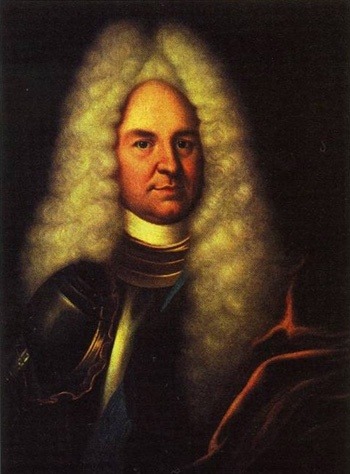
November 29th 1699 saw the death of Patrick Leopold Gordon, general of the Imperial Russian army.
Born March 31st 1635, Patrick Leopold Gordon of Auchleuchries , as a young man he left Scotland, which was torn by religious and political strife, Gordon went to Danzig (now Gdańsk) in Poland and studied at the Jesuit College for two years He had decided the life of a priest wasn’t for him and was on his way back to Scotland when a Polish-Swedish war broke out in 1655, he became a mercenary and fought on different occasions for both sides.
In 1661 Gordon entered the Russian army as a major, and, after suppressing the Moscow riots of 1663, he was promoted to the rank of colonel. In 1666 Tsar Alexis sent him as an envoy to England, but he failed to complete his mission satisfactorily and lost the tsar’s favour. Despite his efforts to leave the Russian service, his position improved with succeeding regimes, particularly after he heroically defended Chigirin (located in Ukraine), which was besieged by the Turks in 1678. He then rose to become a close advisor to Russian Tsar, Peter the Great being promoted to the rank of General-in-Chief and was also made an admiral of the Russian navy. It is even said that Peter entrusted Gordon take charge of his empire while he visited Western Europe. The two became such close friends that Tsar Peter kept vigil at Gordon’s deathbed.
The great Russian historian, S.М. Soloviev, regarded Patrick Gordon as “one of the most remarkable men” ever employed by the tsars, and was grateful to him for “recording his adventures and existence day by day, leaving to us curious tidings of himself, of his brothers in arms, and of Russia before the age of transformation” – and much else besides. Passages from the Diary were published in 1849. The original is preserved in manuscript in the Russian State Military Archive in Moscow.
9 notes
·
View notes
Text
Advent Calendar: Day 7
@tangleweave
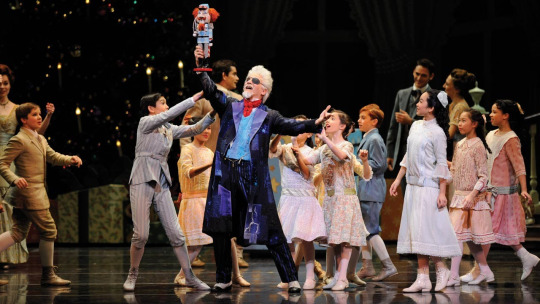
“So, uh…”
Nothing good ever really starts that way. So in that moment, when Beth has barely set her purse down and kicked her crocs off at the door, and finds Eddie standing beside the stairs, hair slicked back, wearing a gorgeous Armani tux ~one she bought for him for the first benefit evening he suffered through for her~ and looking for all the world like he’s swallowed bees, Beth feels her heart tick up its pace, hammering like the sea tide in her ears. She watches him as he pulls out his phone and he swipes a few times. He glances from the screen to her face. Nervousness practically drips off him.
“Sometimes, a gift isn’t just’a gift. It’s a key to a new world. A young heroine, a Nutcracker-turned-prince. The small but mighty army of mice. The beautiful conclusion of a sugar plum celebration. It’s a story so good…”
Whatever else was written on his phone is tossed aside as he smiles at her.
“Look, Beth. I know it’s not Moscow, but it’s still your favorite ballet. Curtain call in three hours, figured that would be enough time for you to get dolled up and ready to go. Merry early Christmas?”
It takes several seconds and then a few more for Beth to catch up with everything he’s said. To net from the stream of his conscience the meaning of his words. But when she does? The exhaustion of a pre-holiday emergency room shift ~shorter than usual, but also more brutal~ simply melts away. Her eyes prickle with tears as her heart lodges in her throat. First of all, not many people know that the Nutcracker is her favourite ballet. Nor that her dream is to see it in Russian, danced by the Bolshoi. And she knows for a fact that tickets have been sold out for weeks now. She’d checked for a matinee performance. Her hands come up and cover her mouth with the tips of her fingers.
“I’m getting the feeling that…now wasn’t such a good time?”
“Oh, Ekie,” she whispers, and his answer prickles the small hairs at the back of his neck, just where his hand goes to rub.
It doesn’t stop her from dashing up to him, throwing her arms around his waist and pulling him down enough that she could kiss him.
~*~
He survives the first fifty minutes inside the packed War Memorial Opera House with his body mostly intact. Maybe his arm is a little numb because from the moment the curtain rose, Beth leaned into him, her head on his shoulder, absolutely lost in the beauty and pageantry on the stage. There’s no missing the sigh she breathes when Herr Drosselmeyer appears, it’s the same one that graces his ear when his lips glide along the shapely bones of her collar. Not even a surprise to him. A mysterious old..er…man who is the catalyst of the whole story. A good guy or a bad one left up to imagination. Sweet or Sinister? A merry magician or a scheming sorcerer whose motivations are never quite clear? He knows how she would answer if asked but all he does is press a kiss to her brow.
He excuses himself to the men’s room, where he splashes a little water on his face and removes the near invisible ear-plugs. It isn’t that he hates the music, but in getting her orchestra-pit centre stage tickets, he’s playing a deadly game with the welfare of his Other. Still, he doesn’t want to ruin his girl’s gift, either. So it’s a compromise he felt best about.
~*~
The cab drops them off in front of the townhouse and before the door is even closed, her shoes are dangling from her fingertips. She slides an arm around his back as they drift toward the door. One dark tendril oozes around her skin under her coat-sleeve. “Dat was amazing. Mahalo nui loa, Eddie.”
“I did good, huh?”
“More dan good.”
They pause on the doorstep, light streaming through the glass and the middle of the wreath, spilling onto them as she tip-toes up for a kiss.
#tangleweave#A Guy-a Girl-and Some Goo|Eddie-Beth-Beloved#Lethal Protector|Venom verse#Mission in the Rain|San Francisco#Merry Christmas 2022
3 notes
·
View notes
Video
youtube
A great report from Ukraine TV (English edition) showing how the Kremlin is blackmailing and imprisoning any Russian who condemns the war in Ukraine. Ivan Safronov, pictured above, has been sentenced to 22 years in prison.
Since protests across Russia against the war in Ukraine, Putin introduced laws against so-called “false” information that discredits the Russian army. Condemning the war is also illegal; you have to pretend that it is a ‘special miltary operation’. Police can check phones, and several sites have been blocked. People have lost their jobs for opposing the war, such as the former director of the Bolshoi Theatre and many others.
The Kremlin is also instructing Russian teachers to promote hatred and war against Ukraine. One teacher quoted in this video lies to her children by claiming that NATO has put weapons in Ukraine to attack Russia, and that Russia has the best weapons and needs to fight against this. The Kremlin has used this tactic before, especially when promoting Putin’s anti-Western propaganda, and has also encouraged teachers to help it stuff ballots at elections.
The video description to this report also shows that the respected independent Russian newspaper, Novaya Gazeta, has been denied a licence by the Russian federal services. The Novaya Gazeta has a long history of exposing war crimes committed by Russian soldiers. One of its most famous and internationally respected reporters, Anna Politkovskaya, exposed the crimes of Russian soldiers in Chechnya, as well as the morally repugnant internal system of the Russian army which turned young men into savages, often killing them in large numbers.
Telekanal Dozhd, another independent Russian news outlet, was forced to operate from abroad, providing Russian viewers with the truth about the war in Ukraine and other ‘forbidden’ topics. Telekanal Dozhd is considered a ‘foreign agent’, another fraudulent term introduced by the Russian government in 2012 to attack anyone who condemns Putin’s dictatorship. Many other groups and people have been designated as ‘foreign agents’, threatened, shut down, imprisoned, or even murdered.
It is clear that Putin is desperate to shut down anyone who condemns his war because he knows that many in Russia do not support it. As we have seen from Russian history, it only takes a small number of people to spark national upheaval, and Putin’s regime has been in constant danger over the last decade as anger increases over fraudulent elections, rampant corruption, disgraceful poverty, and Russia’s international isolation. Putin knows that information is power, which is why he has total control over the television, radio, and many websites in order to promote his lies.
The truth is still getting through, however slowly. It is clear that Putin has no victory to announce, even though we know he thought that he could seize control of Ukraine within five days. It is also clear that thousands of Russian soldiers have died, and the Kremlin has remained silent about this, as it is trying to encourage more Russians to join the army. A Russian soldier recently published a book exposing the dire state of the Russian military and his anger with the Russian authorities for starting this war. Much of Russia’s military equipment has been destroyed, including the flagship Moskva. This too cannot be hidden.
Recently, Ukraine has seized back over 1000 square kilometers of its territory from Russia, with more counter-offensives planned for later this year. Each town liberated is another international humiliation for the dictator, Vladimir Putin, and his criminal supporters.
#kremlin#persecution#soviet union#stalinism#stalin#freedom of speech#anna politkovskaya#novaya gazeta#telekana dozhd#russian media#russia#russia blog#russian news#russian politics#kyiv#volodymyr zelenskyy#voter fraud#chechnya
1 note
·
View note
Text
Story #33
War
Blood. Everywhere. It won’t stop. Why won’t it stop? He’s breathing. But he’s not here. He’s not seeing. He’s not living. He’s in pain. He’s bleeding. Why did this happen? I don’t get it. This shouldn’t have happened. It’s my fault. I shouldn’t have lied. Why is this happening? Don’t make me relive this. I can’t. Don’t make me.
I’m back at home with my mother. My father’s in the war right now. This war is dumb. We should have won already. Russia’s weak. Germany’s strong. My father is strong. Mother says he’s dead, but I don’t believe it. He’ll come back.
I tried to join when he did, but apparently sixteen is too young. That shouldn’t matter! If you’re willing to fight, they should let you fight! I’d kill every last Russian, Englishman, Frenchman, Italian, and American! The others wouldn’t even be a challenge. I’ve fought an Indian before. They’re as weak as they used to be. They should go back to being slaves, but for us instead.
Mother is complaining about the “hirnlose Amerikaner” again. It’s annoying. It’s all she talks about now. Father kept the peace between us. Mother and I have never gotten along before. Now it’s worse.
I leave the house for some fresh air. Maybe I’ll find a stray Serbian and die Scheiße aus ihnen herausprügeln. They won’t stand a chance. I walk along the street of my home and see a recruiter. He’s calling for any men of age to join the war. “Helfen Sie mit, die Russen zu bekämpfen! Die Österreicher sind ohne uns zu schwach!”
I look at myself in a nearby puddle. Father has always said I look older than I am. Maybe I can fool a recruiter.
Getting into line, I look at the people about to join with me. Way too many old people. Somebody looks like he’s got a broken arm. Why are these schwächlinge joining the army? They won’t be of any help!
The recruiter looks at me for a moment. “Das Alter?” He asks. I hesitate. I don’t lie often. Mother says I’m a bad liar. “Achtzehn.” I say quickly. I have to be careful. One lie could get me in a lot of trouble. “Geh weiter. Sie bringen das Fahrzeug zur Basis. Tu, was dir gesagt wird.” I nod and walk past him.
A few days later, I’m in a vehicle, heading to a trench that called reinforcements. I’m ready to fight. These stupid Russians won’t know what hit them. Walter is sitting beside me, clutching his Gewehr 43 close to his chest. “Oh, look at the scared German,” I start in a terrible American accent. “How easy it will be to kill him!” I laugh. Walter does not.
“Mach keine Witze darüber!” He yells at me, still scared. I sigh and pat his back. Walter and I became friends quickly. We bumped into each other when he fell off the climbing wall. He’s not the bravest, but he’s pretty smart. “Mach dir keine Sorgen. Ich mach nur Spaß. Du musst dich beruhigen.” I say. He’ll get himself killed if he continues to be a verängstigtes kind.
The vehicle stops and we quickly exit and go into the trenches. Bullets are flying by and I can’t hear anybody over the loud fire of the guns. I’ve lost Walter and my group. I have no idea where I am. Now I’m the verängstigtes kind.
Something scratches my ear and I flinch down. My ear is bleeding. A bullet must have scraped it. It’s not deep, but it hurts a lot and it keeps bleeding. I load my gun and fire back to the Russians. How dare they think they can defeat us. The nerve of them! Dumme Russen!
The gunfire stops for a moment and I look around. Everybody is looking upward, so I follow. Canisters are flying through the air, spewing yellowish-green gas from them. Now those Russians are in trouble. “Vorauszahlung! Töte die verdammten Russen!”
Everyone flies forward and I follow quickly, ready to spill the blood of whatever Russian gets in my way. Something comes out of the gas ahead of us. A limping Russian with a rag over his mouth. His skin is red and he’s coughing, barely holding onto his weapon.
He shoots towards someone, surprisingly able to aim and fire his gun. I turn to see what weak German was just hit by a dumb Russian.
Walter staggers. His gun falls and he clutches his chest. I can’t breathe. Blood spills from his chest as he falls to the ground, gasping for breath. I run to him. Blöder Russe! How dare you shoot Walter! I’ll kill you! I turn back to the Russian, but he’s gone. I look back to Walter.
Blood. Everywhere. It won’t stop. Why won’t it stop? He’s breathing. But he’s not here. He’s not seeing. He’s not living. He’s in pain. He’s bleeding. Why did this happen? I don’t get it. This shouldn’t have happened. It’s my fault. I shouldn’t have lied. Why is this happening? Don’t make me relive this. I can’t. Don’t make me.
Something sharp hits me. I choke on my breath. I can’t think. I can’t. Where am I? Why am I here? Where is Father and Mother? Walter? I see more blood. It’s mine now. I’m dying with him. I don’t get it. My heart is beating. I feel it. I’m strong, so why am I dying? Ich hasse diesen Krieg. Ich wünschte, ich wäre nie gegangen.
(I was told I couldn't write something like this, so I went "bet" and proceeded to write the shittiest story ever)
0 notes
Text
What is Memorial Day and Why Do Americans Celebrate It?
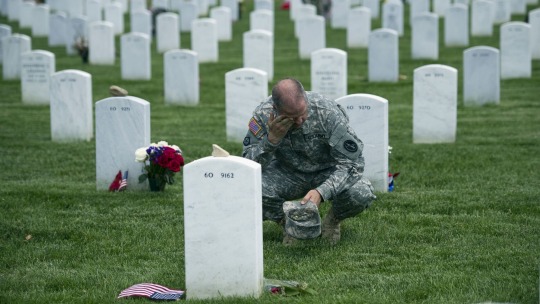
Army Col. Matthew Rasmussen of the Army Military District of Washington, wipes tears from his eyes while visiting the grave of Army Staff Sgt. Richard Tieman, 28, of Waynesboro, Pa., places flags at grave sites at Arlington National Cemetery in Arlington, Va., Thursday, May 22, 2014 - Sputnik International, May 24, 2023 © AP Photo/Cliff Owen
On May 29, the US celebrates Memorial Day, honoring the men and women who died while serving in the military. When did this holiday begin and why is it so important?
Memorial Day is observed on the last Monday of May. Cities and towns across the US host military parades, Americans gather to have cook-outs with friends and family or go shopping.
This day also marks an unofficial beginning of the summer season as schools and universities adjourn and daytime temperatures go up. However, it is much more than a jolly three-day weekend.
Why Do Americans Celebrate Memorial Day?
Initially, the day was known as Decoration Day, originating from a post-Civil War era.
The American Civil War (1861 – 1865) was fought between the Union and 11 Southern states that formed the Confederate States of America. An estimated 620,000 men, or a whopping 2% of the nation's population, lost their lives in the line of duty. Experts say that taken as a percentage of today's population, the toll would have equated to six million people.
Remarkably, Russia played a role in the Union's victory. At that time the United States was threatened by Great Britain and France, although the European powers did not directly intervene in the course of the war. However, London and Paris were expected to interfere due to their close trade ties with the South.
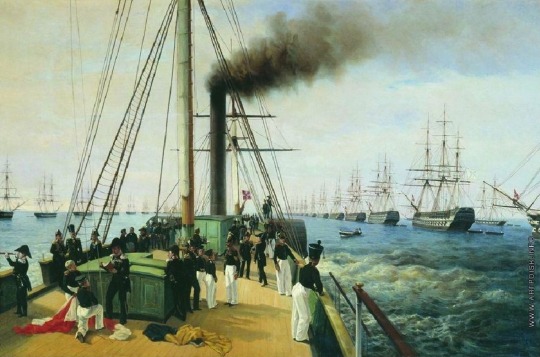
Imperial Inspection of Baltysky Navy Fleet in 1848. By A.P.Bogolyubov. 1850-60. © Photo: http://artpoisk.info
The arrival of Russian warships in San Francisco and New York in 1863 nullified the possibility of a foreign invasion and stripped the South of an opportunity to attack the California coast. Northern commanders gave a warm welcome to Russian admirals on the Pacific and the Atlantic coasts.
In fact, the Russian Empire returned the favor to the young American nation: eight years earlier, the United States became the only Western country that tacitly supported Russia during the Crimean War of 1853-1856.
The bloody Civil War ended on April 9, 1865, requiring the establishment of the country’s first national cemeteries. By the late 1860s, Americans had begun holding springtime tributes to fallen soldiers, decorating their graves with flowers.
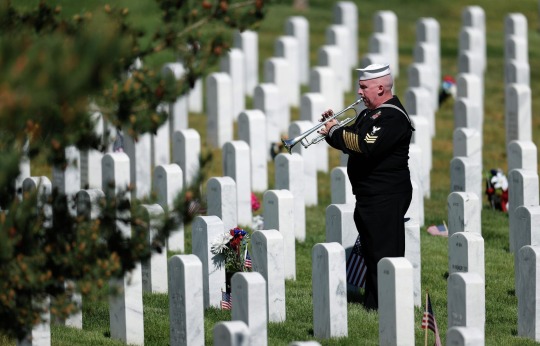
Retired US Navy Yeoman First Class Mark Stallins plays "Taps" for Memorial Day at a gravesite in Fort Logan National Cemetery Monday, May 25, 2020, in Sheridan, Colo. © AP Photo
Where is the Official Birthplace of Memorial Day?
It is unclear where exactly the tradition originated: approximately 25 places have claimed to be the birthplace of the holiday.
According to some sources, three women in Boalsburg, Pennsylvania, began to decorate the graves of their loved ones who died during the Civil War as early as in October 1864. In July 1865 their fellow citizens joined them for a general commemoration. A similar event took place in May 1865 in Charleston, South Carolina.
According to other sources, in early March 1866, Mary Ann Williams, secretary of the Ladies’ Memorial Association of Columbus, wrote a letter calling on Southerners to come together one day a year to put flowers on the graves of fallen soldiers. Her letter was published in the Columbus Daily Sun at that time.
Meanwhile, Henry Welles, a Waterloo, New York, pharmacist, is said to suggest formally setting a day for the town to honor those killed in the war in 1865.
Eventually, in 1966, US President Lyndon B. Johnson proclaimed Waterloo the birthplace of Memorial Day: the town had started to hold celebrations since May 5, 1866, during which businesses were closed and residents decorated the graves of military soldiers with flowers and flags.

Union soldiers outside the Capitol building during the US Civil War © Photo: Architect of the Capitol
Why Did They Call it Decoration Day?
On May 5, 1868, John A. Logan, the commander in chief of the Grand Army of the Republic (GAR), an organization of Union veterans, issued General Order Number 11 designating May 30 as a memorial day "for the purpose of strewing with flowers or otherwise decorating the graves of comrades who died in defense of their country during the late rebellion and whose bodies now lie in almost every city, village and hamlet churchyard in the land."
Having started his political career as a Democrat, Logan returned to politics after the end of the Civil War as a Republican who advocated African-American rights. He repeatedly won House elections, and was also one of the seven impeachment managers in the trial of President Andrew Johnson in 1868.
Logan's political and military influence was immense, with GAR becoming a powerful lobbying group. He used his charisma to nationalize multiregional grave-decorating in a national holiday which he called "Decoration Day."
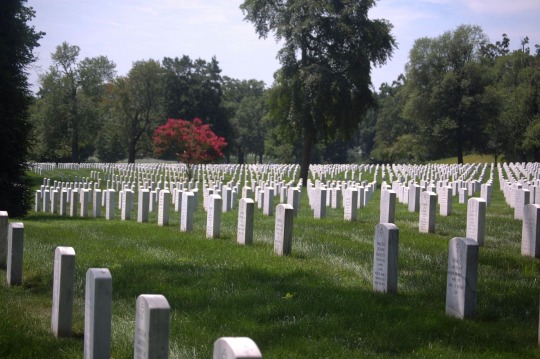
Arlington National Cemetery. © Photo: Public Domain
When Was the First Decoration Day?
The first national celebration of Decoration Day was held on May 30, 1868, at Arlington National Cemetery, which has become the most famous burial ground for many US military heroes.
Around 400,000 veterans from every American conflict - starting with the Revolutionary War and ending with Iraq and Afghanistan wars – have been buried there.
On the first Decoration Day, James Garfield, then an Ohio congressman who had previously served as a Union major general, delivered a speech at Arlington National Cemetery:
"I love to believe that no heroic sacrifice is ever lost," Garfield said. "That the characters of men are molded and inspired by what their fathers have done; that treasured up in American souls are all the unconscious influences of the great deeds of the Anglo-Saxon race."
On that day, five thousand participants of the celebration decorated the graves of the 20,000 Civil War soldiers buried there. In March 1881, James Garfield was sworn in as the US president; unfortunately, just months later he was killed by an assassin which made his tenure the second shortest in US history.

Soldiers of the Russian Army during World War I. © RIA Novosti. Staff-capitan Martynov/Go to the mediabank
When Did Memorial Day Become a Federal Holiday?
During the First World War I (1914-1918), the US fought on the side of the Allied countries led by Russia, Britain, and France against the Central Powers led by Germany and Austria-Hungary. Even though at the start of the war, US President Woodrow Wilson declared neutrality, Germany's sinking of 120 US citizens traveling on the British ship Lusitania on May 7, 1915, prompted a nationwide outrage. Berlin's subsequent attacks on American vessels and attempts to interfere in US-Mexican relations forced Washington to declare war on Germany on April 6, 1917.
Around four million US soldiers were mobilized at the time. Eventually, the conflict claimed the lives of approximately 117,000 military personnel who died during combat and from other causes including wounds and influenza.
The Second World War (1939-1945) is seen by some historians as a logical continuation of the first. This time Moscow, London and Washington countered the Nazi Germany-led coalition.
Initially, the US just provided military aid and other assistance to the Allies and joined the conflict following the Japanese attack on Pearl Harbor on December 7, 1941.
It is estimated that during WW2, the US lost around 407,000 soldiers and around 12,000 civilians. During WW2, the US became the first country to build nuclear weapons and the only one to have used them in combat by bombing Japanese cities of Hiroshima and Nagasaki.
After the Second World War, the Cold War between the "capitalist" and "communist" camp began with the US proceeding with their overseas operations. US soldiers joined the war on the side of South Korea in 1950 against the Democratic People's Republic of Korea (DPRK) backed by the USSR and China at the time.
Fighting ended in 1953 with the DPRK upholding its independence and the two Koreas remaining split. In total, approximately 36,574 US soldiers were killed in the Korean War theater. The DPRK and China accused the US of using biological or germ warfare weapons during the conflict, something that the US government denied.
Just a year later, in 1954, the US got involved in another conflict providing military support and training to Northern Vietnam against the Communist South. Washington's interference in Southeast Asia affairs was at the time justified by the "domino effect" concept.
A memorandum from the Board of National Estimates to the Director of Central Intelligence, dated June 9, 1964, explained that the "'domino effect' appears to mean that when one nation falls to communism the impact is such as to weaken the resistance of other countries and facilitate, if not cause, their fall to communism."
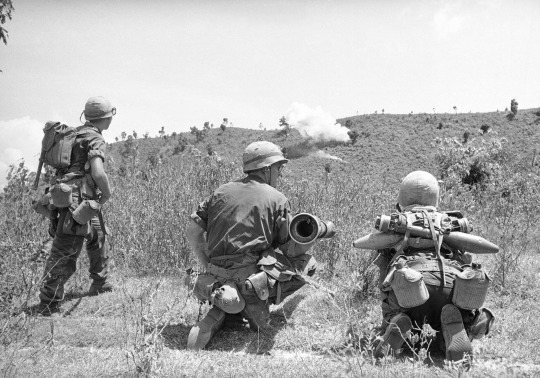
US Marines in the Vietnam War. © AP Photo/Eddie Adams
In March 1965, President Lyndon B. Johnson sent US troops into Vietnam. As per Pulitzer Prize-winning journalist Seymour Hersh, the US entered the hostilities under a false pretext. Moreover, the US military resorted to the use of chemical weapons in Vietnam, including the infamous Agent Orange, a potent chemical herbicide.
The Vietnam War polarized US society, triggering a series of nationwide protests. Student protests concerning the "draft" started on May 5, 1965. The October 15, 1969, peace protests brought together around 15 million Americans. The exhaustive war lasted until the fall of Saigon on April 30, 1975, and claimed the lives of 58,220 US soldiers and millions of Vietnamese.
In 1971, Congress passed the Uniform Monday Holiday Act which turned Decoration Day into a federal holiday called Memorial Day. It was stipulated that the event would be held on the last Monday of May honoring all Americans who served and died in US wars.
What is the Difference Between Memorial Day and Veterans Day?
Apart from Memorial Day, the US also celebrates Veterans Day. While both holidays honor American military soldiers and their sacrifices for the sake of the US freedoms and national interests, Memorial Day commemorates those who lost their lives, and Veterans Day honors all those who served in the US Armed Forces. Veterans Day is observed on November 11, regardless of what day of the week it falls.
What Do Americans Do on Memorial Day?
On that three-day weekend, Americans usually travel to see their friends and family. They also visit history museums, attend military parades and competitions. Many Americans also visit cemeteries to honor their relatives who died while serving in the US Armed Forces.
Each year, Memorial Day is commemorated at Arlington National Cemetery with a ceremony of placing a small American flag on each grave by the 3rd US Infantry Regiment, also known as the "Old Guard". The tradition, which is known as "Flags In," originates from 1948 when the Old Guard was designated as the Army's official ceremonial unit. All in all, small American flags are placed in front of over 228,000 headstones as well as at the bottom of thousands of niche rows in Columbarium Courts and Niche Wall. After Memorial Day, all flags are removed.
The president of the United States usually delivers an address at the Memorial Day ceremony at Arlington National Cemetery. The president or vice-president also lays a wreath at the Tomb of the Unknown Soldier on that day.

In this Wednesday, July 17, 2019 photo, US Marines carry transfer cases holding the possible remains of unidentified service members lost in the Battle of Tarawa during World War II, during what is known as an honorable carry conducted by the Defense POW/MIA Accounting Agency (DPAA), in a hangar at Joint Base Pearl Harbor-Hickam in Hawaii. © AP Photo/Sgt. Jacqueline Clifford/US Marine Corps
Is it Appropriate to Say 'Happy Memorial Day'?
While some Americans believe it is okay to say "Happy Memorial Day", others doubt that this phrase is appropriate: for those who lost their loved ones this is a period of grief and reflection. This is a day to honor American history and its heroes and mourn a dear relative or friend who died while serving the nation.
Some American websites offer more appropriate phrases to say on the day. For instance: “I will be taking a moment this weekend to honor those who served our nation and are no longer with us." Or simply: "Thank you for your service."
Over the past 30 years, the US has continued to beef up its military presence across the world and take part in overseas conflicts. New sophisticated weapons and military tactics allowed lessening US combat casualties.
Thus, the Gulf War of 1990-1991 saw only 383 US troops killed, while the wars in Iraq and Afghanistan claimed the lives of 6,840 or 8,498 American soldiers, according to different estimates. The new US hybrid war doctrine, first detailed by Ret. Lieutenant Colonel Frank Hoffman, US Marine Corps, in the early 2000s, led to the increasing use of foreign proxies and mercenaries in various war theaters that allowed diminishing US military casualties even further.
Nonetheless, as per the National Institutes of Health, half of the men who die every day in the US are military veterans. According to some estimates, over 600,000 American veterans are dying every year, due to natural causes. Moreover, the US loses over 6,000 US military veterans to suicide each year.
All passed away soldiers who did their duty and patriotically served the country deserve remembrance and respect. Therefore, people across the world pay their tribute to fallen defenders.
0 notes